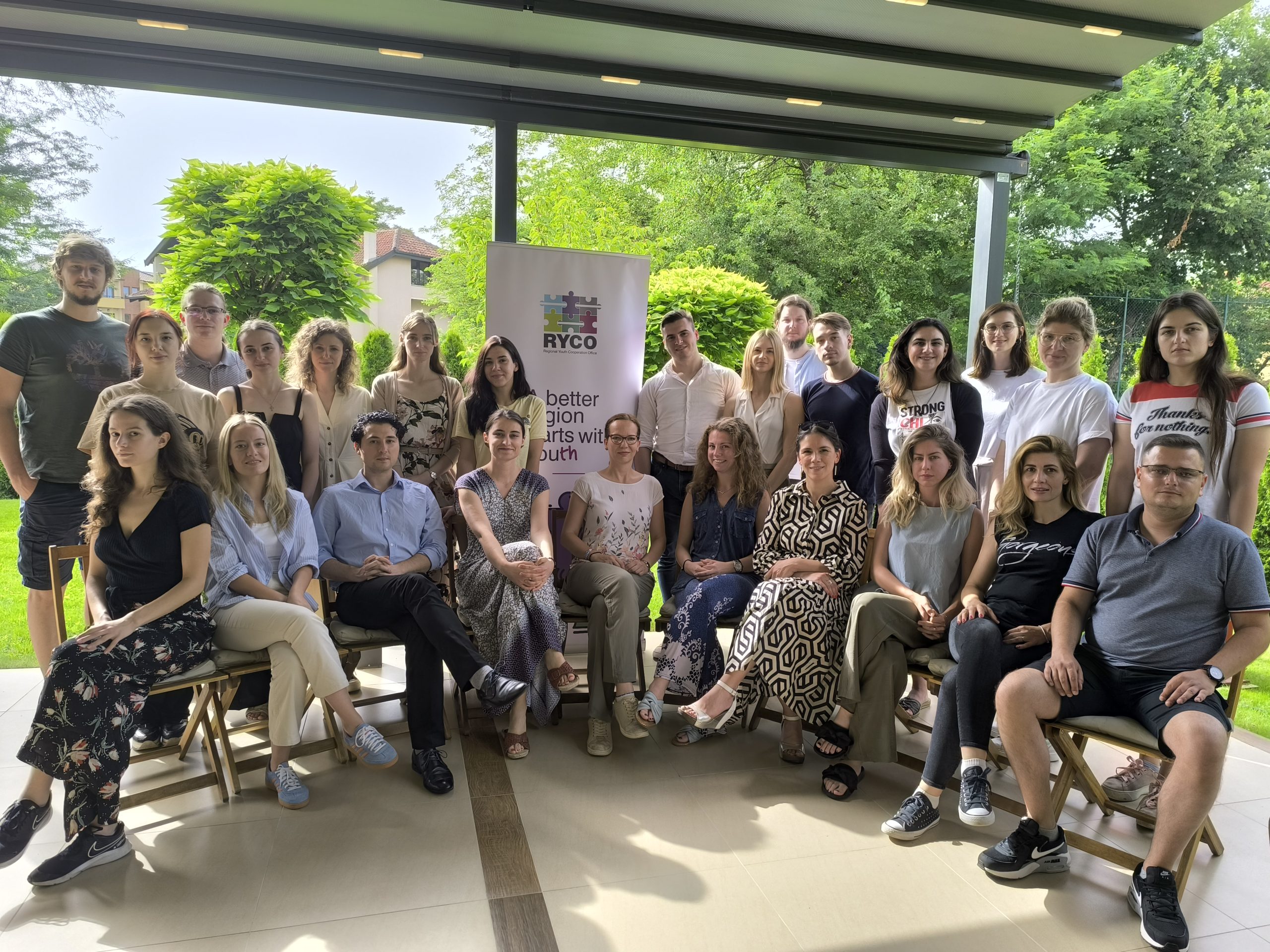
Exploring Youth Peace and Security – Creating a change
Srebrno jezero – RYCO LBO Serbia together with the OSCE Mission to Serbia and Faculty of Political Sciences, University of Belgrade organized for the second year in a row Capacity Building Training on Srebrno jezero, from 7th to 10th Jun 2024, that was designed to empower students in developing projects focused on the Youth Peace and Security agenda.
Throughout the training, participants explored various stages of project proposal development, from understanding project design logic to diving into gender mainstreaming. Engaging activities, among which was Participation game provided hands-on experience, while sessions on Youth Peace and Security (YPS) pillars and projects and insights from donors broadened perspectives and inspired innovation. Training provided an invaluable opportunity for students to YPS, develope their project proposals the students’ project ideas, enhancing their potential to create positive change in their communities. This is a sucessful continuation of cooperation between RYCO LBO SRB, the OSCE Mission to Serbia, and FPN Master’s studies in Peace, Security, and Development.
The Youth, Peace and Security (YPS) Agenda established by the United Nations Security Council Resolution (UNSCR) 2250 in 2015 recognises the inclusion and participation of young people as a key dimension of building and sustaining peace and security for all. It called upon governments, international organizations, civil society, and other stakeholders to work together to support youth’s active role in promoting peace and preventing violence. One of the strategic objectives of RYCO Strategy 2022-2024 is in line with and will promote the Youth Peace and Security Agenda through activities and mechanisms which will contribute to its broader goals, working towards a more inclusive, peaceful, and prosperous future for young people in the region.
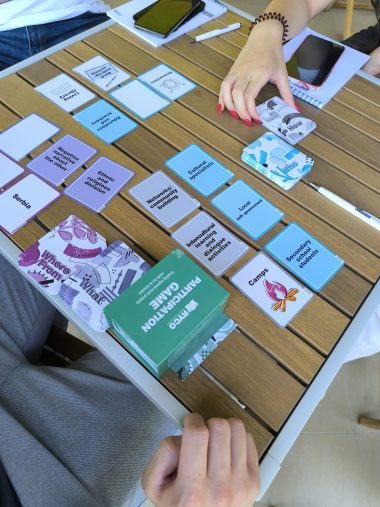
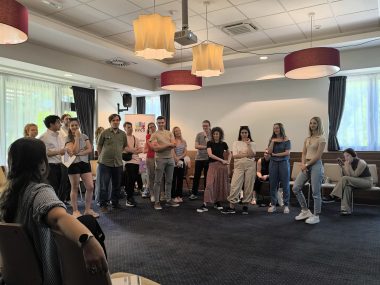
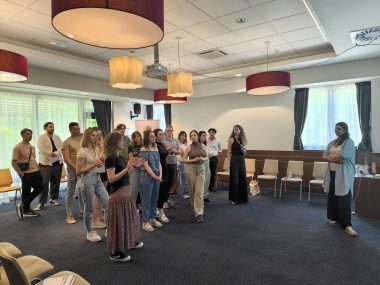
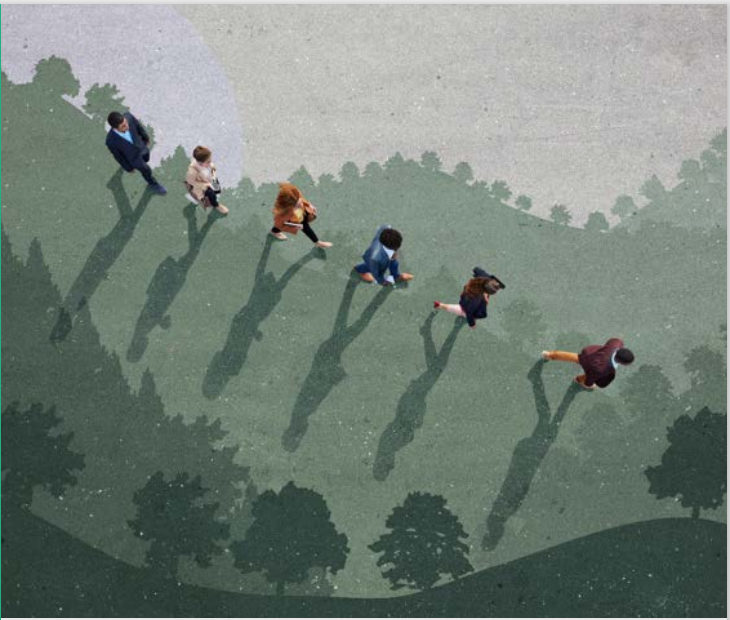
YPS EDUCATION
YPS EDUCATION

Youth, Peace and Security A qualitative analysis of UNSCR 2250 and the international response to a new security agenda
The role of youth in peace and conflict became central in the global security debate in 2015 when the United Nations Security Council unanimously adopted the Security Council Resolution 2250 on Youth, Peace and Security (UNSCR 2250). This event is regarded by the advocates of the resolution as a significant shift in the discourse on youth in international peace and security. Focusing on the positive agency of youth in peace building, calling for structural inclusion of youth in all levels of peace building and decision-making makes this thematic resolution the first of its kind.
This thesis uses detailed narrative process tracing to investigate how UNSCR 2250 emerged and elaborates on and discusses the important turning points in the time leading up to the Security Council’s decision. The thesis also conducts a content analysis of the UN Peacebuilding Fund’s Youth Promotion Initiative (PBF YPI) to identify the focus areas in the YPI projects in order to understand how UNSCR 2250 is currently being conceptualized and implemented within the UN system.
The research in this thesis finds that the adoption of UNSCR 2250 in 2015 was a result of immense advocacy work by CSOs and UN entities outside of the Security Council, but also that other politically determining factors proved important. Four years on, the implementation of UNSCR 2250 has begun. The analysis of projects funded through the PBF YPI finds that participation and education are two of the most important focus areas of implementation. By financing youth projects tailored to local communities and conflict situations, the PBF YPI are laying the foundation of the implementation of UNSCR 2250 in its early phases.
Read full article: Youth, Peace and Security: A qualitative analysis of UNSCR 2250 and the international response to a new security agenda
Disclaimer: Third-Party Content
This article was originally published by Ingrid Elene Anderson. All rights remain with the original author(s)/publisher. The views expressed are theirs and do not reflect those of RYCO and the granting authority.
If you are the copyright owner and believe this content has been shared in a way that violates your rights, please contact us at comms@rycowb.org, and we will promptly address your concerns.

Case Studies In Action: Youth Empowerment For A Peaceful Caribbean
This compilation, titled “Case Studies in Action: Youth Empowerment for a Peaceful Caribbean” presents fourteen concise case studies highlighting (sub-)regional, national, and local initiatives that contribute to the operationalisation of the Youth, Peace, and Security (YPS) agenda. It features a combination of initiatives led by government, regional organisations, the United Nations, youth organisations, civil society, and multi-stakeholder groups across the Dutch and English-speaking Caribbean. The primary objective of this overview is to enrich the knowledge base on meaningful youth engagement in peace and security issues within the region, shedding light on successful approaches, obstacles encountered, and lessons learned. Organised into five sections aligned with the pillars of the YPS agenda-prevention, protection, disengagement and reintegration, partnership, and participation-the case studies are accompanied by an introduction and a summary of recommendations.
Read full article: Youth, Peace & Security, case studies in action: youth empowerment for a peaceful Caribbean
Disclaimer: Third-Party Content
This article was originally published by the United Nations Development Programme. All rights remain with the original author(s)/publisher. The views expressed are theirs and do not reflect those of RYCO and the granting authority.
If you are the copyright owner and believe this content has been shared in a way that violates your rights, please contact us at comms@rycowb.org, and we will promptly address your concerns.
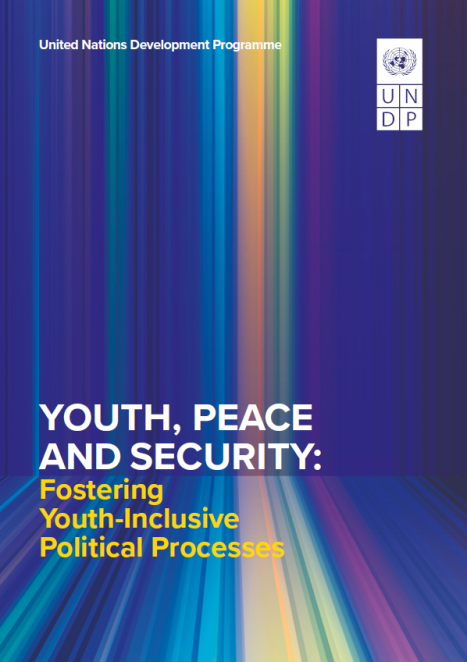
Youth, Peace and Security: Fostering Youth-Inclusive Political Processes
Currently, our world is home to 1.8 billion young individuals (between the ages of 10 and 24 years old). The lack of meaningful engagement of young people in political processes, for any reason, negatively impacts not only them but also our broader communities. Despite their demographic importance, many young people still encounter barriers and challenges when trying to engage in political and civic activities.
This Guide aims to serve as a comprehensive resource for practitioners and experts devoted to advancing the Youth, Peace and Security agenda, with an emphasis on young people’s participation.
It identifies opportunities and challenges with regards to political participation of young people and provides insights on potential barriers to their ability to meaningfully engage in the political and civic spheres. Illustrated with inspiring examples and case studies from across the world, the Guide includes specific recommendations to foster youth-inclusive political processes and facilitate this meaningful engagement.
The Guide was developed by the United Nations Development Programme (UNDP), as a co-chair of the Task Force on Youth in Politics in the Global Coalition on Youth, Peace and Security. It is the result of a participatory process, including a desk review, interviews with experts and practitioners, and regular consultations with the members of the Task Force on Youth in Politics.
Read full article: Youth, Peace and Security: Fostering Youth-Inclusive Political Processes
Disclaimer: Third-Party Content
This article was originally published by the United Nations Development Programme. All rights remain with the original author(s)/publisher. The views expressed are theirs and do not reflect those of RYCO and the granting authority.
If you are the copyright owner and believe this content has been shared in a way that violates your rights, please contact us at comms@rycowb.org, and we will promptly address your concerns.

Beyond Vulnerability A Guidance Note On Youth, Climate, Peace And Security
The climate crisis is already here, and today’s youth and future generations will face its most severe consequences. That includes the approximately one billion young people who live in less developed regions-one-quarter of whom live in the world’s Least Developed Countries (LDCs), where climate change impacts are the most severe. Indeed, without accelerated climate action, children born in the year 2020 could experience up to seven times more extreme weather events like scorching heatwaves during their lifetimes compared to their grandparents.1 While young people have contributed little to climate change, they are the ones who are and will continue to be disproportionately affected by its damaging environmental and social impacts. Moreover, while climate change alone does not cause conflict, its impacts can exacerbate vulnerabilities, undermine livelihoods, and increase grievances and tensions which may in some cases increase the risk of violent conflict. These interlinked challenges demand urgent and collective action.
Across the globe, many young people are now assuming responsibility for responding to the unsustainable societal and environmental trajectories set by previous generations. They are driving change in their communities and on the global stage to address the interlinked climate and conflict crises-everything from leading efforts to restore our natural world to influencing the outcomes of climate negotiations and leading efforts for climate justice and intergenerational equity in courtrooms. Others are finding innovative ways of adapting to new uncertain realities. It is crucial to move beyond viewing young people only as vulnerable and to recognize their resilient responses, while reinforcing their pivotal roles as leaders in climate and peace action. Young people, in all their diversity, have the undeniable right to participate in decision-making processes, charting paths toward mitigating the impacts of climate-related risks and sustaining peace. Their meaningful engagement is not optional; it is essential for effectively addressing climate-related security risks and ensuring a sustainable future.
Although the connections between youth, climate, peace and security are evident in reality, they have not been adequately translated into integrated policy and programming approaches. This guidance note by the Folke Bernadotte Academy (FBA), the United Nations Development Programme (UNDP), and the Stockholm International Peace Research Institute (SIPRI) is the first of its kind that bridges the climate, peace and security (CPS) and youth, peace and security (YPS) agendas. It sheds new light on how young people are at the leading edge of these efforts-already acting and working in an integrated manner to address climaterelated security risks. It also provides practitioners with exploratory guidance and considerations for creating an integrated agenda on youth, climate, peace and security within research and analysis, programming, strategic planning, policy-making, and funding that can ultimately drive progress on the Sustainable Development Goals.
Read full article: Beyond Vulnerability: A Guidance Note on Youth, Climate, Peace, and Security
Disclaimer: Third-Party Content
This article was originally published by Folke Bernadotte Academy, United Nations Development Programme and the Stockholm International Peace Research Institute. All rights remain with the original author(s)/publisher. The views expressed are theirs and do not reflect those of RYCO and the granting authority.
If you are the copyright owner and believe this content has been shared in a way that violates your rights, please contact us at comms@rycowb.org, and we will promptly address your concerns.

Meaningful Inclusion? Enhancing The Youth, Peace And Security Agenda In Euro-Mediterranean Conflict Resolution
The active role of young people as agents for peace has gained recognition over the last decade. This departure from the traditional international security narrative, which often casts young people as victims or perpetrators in conflict-affected regions, represents a significant shift. The passing of the United Nations Security Council Resolution [UNSC] 2250 (2015) on Youth, Peace and Security, and its subsequent resolutions 2419 (2018) and 2535 (2020) later referred to as the Youth, Peace and Security Agenda (YPS), stand out as a landmark in moving forward this fresh conception of the youth (United Nations Security Council [UNSC], 2250). As the first international policy framework recognising the youth’s positive role in upholding and advancing international peace and security, the YPS Agenda takes a comprehensive approach, going beyond the tendency to view youth solely through a security or victimhood lens. To do so, this approach identifies five key pillars to act on: participation, protection, violence prevention, partnerships, and disengagement and reintegration (UNSC, 2020a).
In particular, the pillar of participation underscores the importance of involving young people1 in the peace-making process. Recognising that the enduring success of a peace agreement hinges on its acceptance or rejection by the succeeding generations, their socialisation during the peace process, and their perceptions of its achievements (McEvoy-Levy, 2001: 5), youth engagement becomes key for sustaining peace (UNSC, 2020a). Recent research emphasises that “the inclusion of young people during all phases of peace processes likely increases the sustainability of the agreements” (Altiok & Grizelj, 2019). However, despite their evident stake in these processes, the formal participation of young people in peace negotiations remains strikingly limited (Simpson, 2018).
This paper examines the YPS Agenda’s call to enable youth engagement in peace-making architectures. It directs its focus to Euro-Mediterranean conflict settings, specifically on the post-Arab Spring scenarios in Yemen and Libya, both characterised by unsuccessful political transitions to democracy (Szmolka, 2017). The central theme revolves around the active participation of young people in the respective peace-making processes within these conflict-ridden countries. After having mapped out their level of engagement, a critical dimension of the analysis involves the examination of the European Union’s (EU) institutionalisation level of the YPS Agenda. Given the EU’s prominent role as a YPS global advocate, the brief aims to formulate targeted policy recommendations to enhance the integration of the YPS Agenda, particularly in relation to youth participation in the Euro Mediterranean conflict settings.
To do this, I first outlined youth formal engagement in conflict-resolution efforts in Yemen and Libya by analysing how the youth is being integrated into relevant peace-making documents and initiatives. Later, I assessed the level of YPS institutionalisation under the EU framework by meticulously mapping events and policy developments specifically connected to the YPS Agenda between the years 2015 and 2023. Finally, in recognition of the EU’s significant influence and its collaborative engagement with the United Nations (UN), a primary mediator in the region’s peace-making efforts, the formulation of final recommendations targeting the EU’s architecture seeks to contribute to a more effective and comprehensive approach to youth involvement in conflict resolution initiatives in the Euro-Mediterranean region.
Read full article: Meaningful Inclusion? Enhancing the Youth, Peace and Security Agenda
Disclaimer: Third-Party Content
This article was originally published by Jusaima Moaid-azm Peregrina, University of Granada. All rights remain with the original author(s)/publisher. The views expressed are theirs and do not reflect those of RYCO and the granting authority.
If you are the copyright owner and believe this content has been shared in a way that violates your rights, please contact us at comms@rycowb.org, and we will promptly address your concerns.
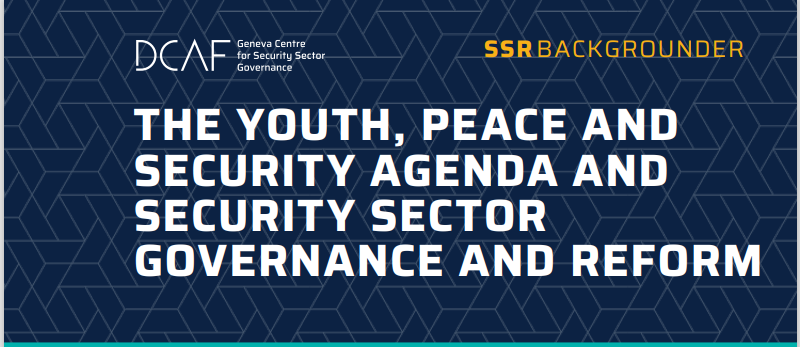
The Youth, Peace And Security Agenda And Security Sector Governance And Reform
This SSR Backgrounder examines the intersection of the Youth, Peace and Security (YPS) Agenda with security sector governance and reform (SSG/R) processes. It underscores the significance of youth in peace and security, due both to the vulnerability of people in this age group to violence and their potential as agents of positive change. It also presents the Five Pillars of YPS, which provide a framework for action through participation, protection, prevention, partnerships, and disengagement and reintegration, which align closely with the principles of SSG/R. SSR processes can thus facilitate implementation of the YPS Agenda and this Backgrounder outlines various ways security sector actors can contribute to YPS. Finally, it highlights that implementing the YPS Agenda and achieving transformative change in security provision for youth requires collaboration between and among security institutions, governments, civil society, and international organizations.
Read full article: The Youth, Peace and Security Agenda and Security Sector Governance and Reform.
Disclaimer: Third-Party Content
This article was originally published by the International Policy Frameworks Programme of DCAF’s Policy and Research Division. All rights remain with the original author(s)/publisher. The views expressed are theirs and do not reflect those of RYCO and the granting authority.
If you are the copyright owner and believe this content has been shared in a way that violates your rights, please contact us at comms@rycowb.org, and we will promptly address your concerns.
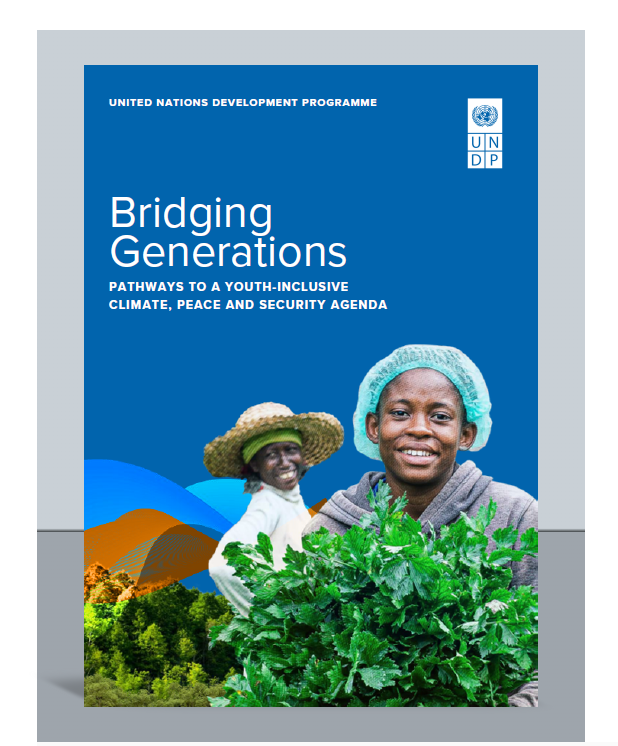
Bridging Generations: Pathways to a Youth-Inclusive Climate, Peace and Security Agenda
Over 698 million young people, ages 15-35, live in fragile and conflict-affected settings. These settings are highly affected by climate change. Young people find themselves in unique positions – they are the most vulnerable to climate, conflict and insecurity, yet they also hold the key as critical actors who can drive change.
This policy paper explores early findings from how UNDP’s Climate, Peace, and Security (CPS) policy and programming engages youth, fosters inclusion, and promotes youth empowerment.
The paper examines potential gaps, challenges, and opportunities, offering early recommendations for improving the integration of youth-sensitive, responsive, and inclusive approaches to CPS.
Read full article: Bridging Generations: Pathways to a Youth-Inclusive Climate
Disclaimer: Third-Party Content
This article was originally published by Conflict Prevention, Peacebuilding and Responsive Institutions Team (CPPRI) at UNDP’s Crisis Bureau, with Anab Ovidie Grand, Policy Analyst – Climate and Security Risk, as lead author, under the guidance of Catherine Wong, Team Leader – Climate and Security Risk. The author is grateful to Benjamin Basmaci, Desislava Kyurkchieva, Gabriela Nones, Judith de Guzman, Julia Mazuranic, Kiduo Mwamnyenyelwa, Martti Karttunen, Mohamoud Khadar, Nora Isayan, Nurudeen-Bashar Saleh, Dieudonne Pascal Alda Yaka, Serena Arcone, Serge Ndjekouneyom, Simon Dennett, Tarik-ul-Islam, Tomokazu Serizawa and Walid Ali for their participation in interviews, Ardy Nugraha, Asabi Rawlins and Azheen Mustafa for their valuable research assistance and inputs in the start of the project, to Giulia Jacovella, Kiri Ginnerup and Pauline Deneufbourg from the UNDP Youth Team for their invaluable inputs into the policy paper and to Adam Forbes, Isabella Caravaggio, Johnson Nkem and Raquel Leandro and for their comments and suggestions provided in the peer review process. All rights remain with the original author(s)/publisher. The views expressed are theirs and do not reflect those of RYCO and the granting authority.
If you are the copyright owner and believe this content has been shared in a way that violates your rights, please contact us at comms@rycowb.org, and we will promptly address your concerns.
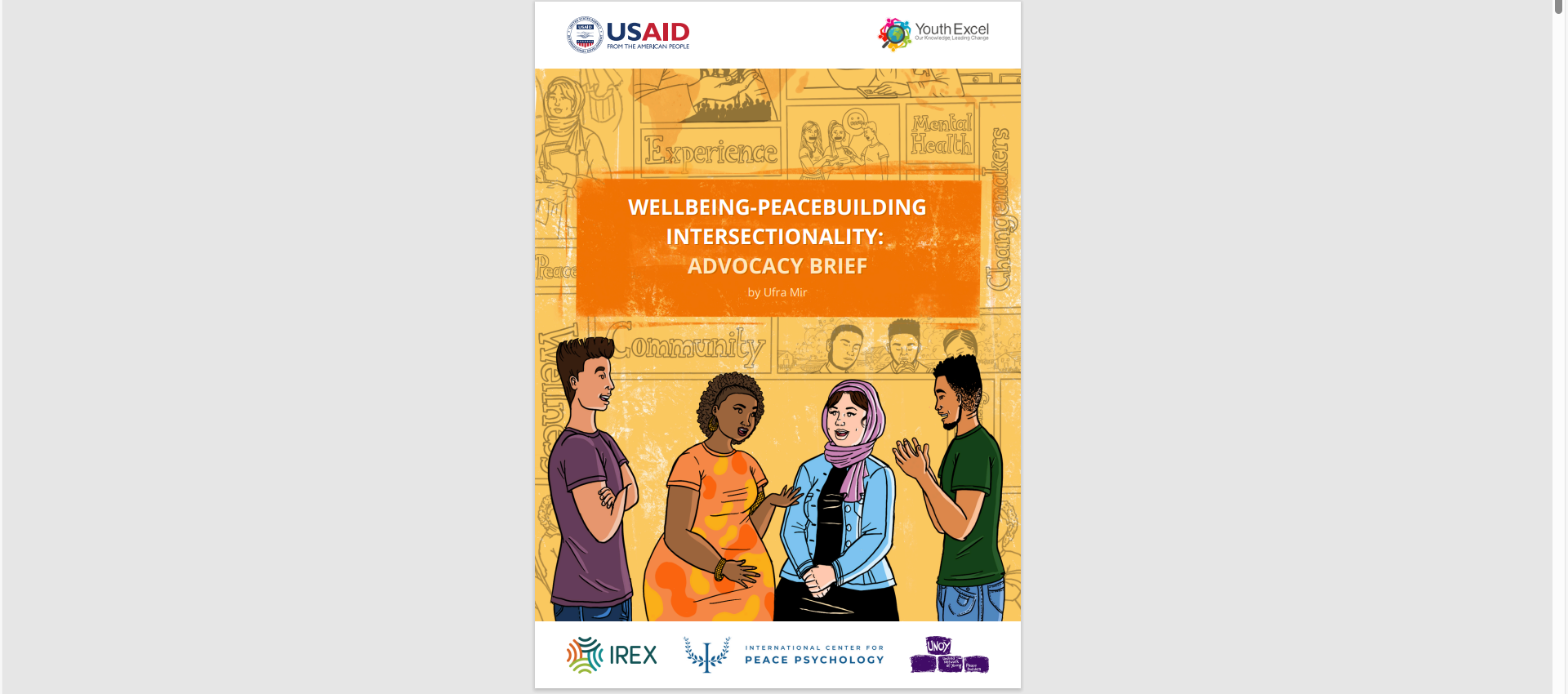
Wellbeing-Peacebuilding Intersectionality: Advocacy Brief
The brief is centered around the experiences, reflections, challenges, and needs of marginalized young people (peacebuilders, activists, leaders, changemakers) from the Global South, who may feel disconnected from mainstream Youth, Peace and Security and peacebuilding forums and spaces, as well as peacebuilding more broadly. Ongoing violence in many conflict-ridden places typically affects young people and their wellbeing in multiple ways; yet, the support (if any) typically offered to them fails to consider the complexities of their situations, environment and experiences, and the multidimensional approach required to support them. Wellbeing and peacebuilding are deeply interconnected, and this intersectionality needs to be understood from a decolonized lens.
As a starting point, the main purpose of this brief is to highlight the current gaps in the wellbeing context within peacebuilding, to advocate for the creation of spaces for young people for dialogue, expression and engagement, and to influence policy-level changes in peacebuilding which can be grounded in wellbeing, justice, nurture and care as foundational values. As such, this brief is primarily intended for donors, policymakers and international organizations in the peacebuilding field.
The brief also brings a reflective and anecdotal-narrative approach that celebrates and values lived-experience knowledge of young peacebuilders and community leaders in the Global South. Thus, the brief is also specifically intended for young peacebuilders, to support them in their work both directly and indirectly. Overall, we hope this brief and the advocacy engagements related to it will be leading to an improvement in how wellbeing of young people is integrated in peacebuilding interventions
Read full article:
Wellbeing – Peacebuilding Intersectionality: Advocacy Brief
Disclaimer: Third-Party Content
This article was originally published by Ufra Mir. All rights remain with the original author(s)/publisher. The views expressed are theirs and do not reflect those of RYCO and the granting authority.
If you are the copyright owner and believe this content has been shared in a way that violates your rights, please contact us at comms@rycowb.org, and we will promptly address your concerns.
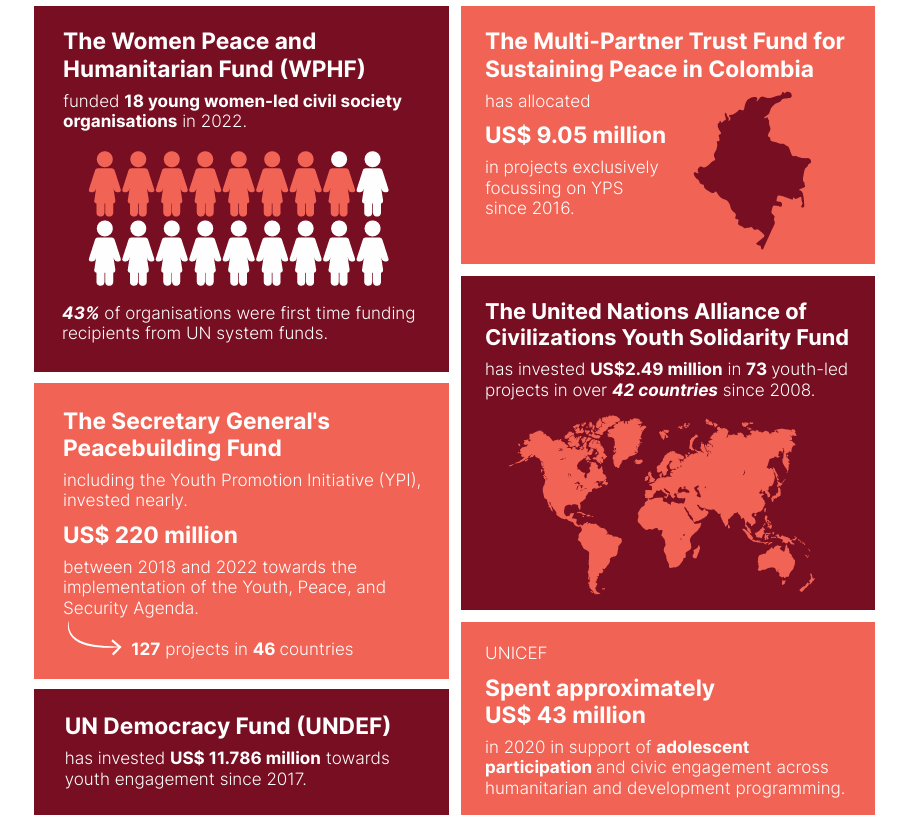
Advancing financing of the Youth, Peace and Security Agenda in the United Nations system: Beyond commitments
Young people play a critical role in efforts for building and sustaining peace. A growing body of evidence demonstrates their importance as mediators, community mobilisers and advocates collaborating across borders to prevent conflict and maintain peace. Through these roles, they strengthen the reach and credibility of peacebuilding programmed within marginalized communities; mobilize powerful social change movements; and employ innovative, intersectional approaches to peacebuilding and conflict prevention. The adoption of three Youth, Peace and Security (YPS) resolutions by the United Nations Security Council (UNSC) is strong recognition of the important positive roles and intersectional approaches by which young people contribute to building and maintaining peace. As such, the resolutions place meaningful participation and inclusion of young people at the front and center of peace and security.
UNSC Resolution 2250 also urges Member States to increase ‘their political, financial, technical and logistical support [for] the needs and participation of youth in peace efforts’. Additionally, the UN General Assembly adopted the Financing for Peacebuilding Resolution in 2022, which recognizes the persistent challenges young people face in accessing resources. Specifically, it calls for ‘efforts to address existing financing gaps for youth-led initiatives and youth organizations to ensure the full, effective and meaningful participation of youth in the design, monitoring, and implementation of peacebuilding efforts at all levels, and encourages all financing stakeholders to increase coordination and collaboration with youth on financing national priorities’. The current global population count sets the number of youth aged 18 – 29 at more than 1.8 billion – the largest age group in the world.
Moreover, youth often constitute most of the inhabitants in conflict-affected contexts.9 Ensuring that young people’s participation in peace efforts is coupled with sufficient resources is therefore crucial. Renewed investment by Member States and other donors is necessary to ensure that the UN meets its commitments on engaging young people as equal partners in peacebuilding.
Additionally, the allocation of existing funds within the UN system should be increasingly directed to YPS. Therefore, this article provides a brief analysis of the current state of financing for the YPS agenda, including youth-led peacebuilding, within the UN system, and outlines recommendations to strengthen these investments.
Read full article:
Advancing financing of the Youth, Peace and Security
Disclaimer: Third-Party Content
This article was originally published by the Office of the Secretary-General’s Envoy on Youth, and the United Network of Young Peacebuilders (UNOY). All rights remain with the original author(s)/publisher. The views expressed are theirs and do not reflect those of RYCO and the granting authority.
If you are the copyright owner and believe this content has been shared in a way that violates your rights, please contact us at comms@rycowb.org, and we will promptly address your concerns.

Advancing financing of the Youth, Peace and Security Agenda in the United Nations system: Beyond commitments
Young people play a critical role in efforts for building and sustaining peace. A growing body of evidence demonstrates their importance as mediators, community mobilisers and advocates collaborating across borders to prevent conflict and maintain peace. Through these roles, they strengthen the reach and credibility of peacebuilding programmed within marginalized communities; mobilize powerful social change movements; and employ innovative, intersectional approaches to peacebuilding and conflict prevention. The adoption of three Youth, Peace and Security (YPS) resolutions by the United Nations Security Council (UNSC) is strong recognition of the important positive roles and intersectional approaches by which young people contribute to building and maintaining peace. As such, the resolutions place meaningful participation and inclusion of young people at the front and center of peace and security.
UNSC Resolution 2250 also urges Member States to increase ‘their political, financial, technical and logistical support [for] the needs and participation of youth in peace efforts’. Additionally, the UN General Assembly adopted the Financing for Peacebuilding Resolution in 2022, which recognizes the persistent challenges young people face in accessing resources. Specifically, it calls for ‘efforts to address existing financing gaps for youth-led initiatives and youth organizations to ensure the full, effective and meaningful participation of youth in the design, monitoring, and implementation of peacebuilding efforts at all levels, and encourages all financing stakeholders to increase coordination and collaboration with youth on financing national priorities’. The current global population count sets the number of youth aged 18-29 at more than 1.8 billion- the largest age group in the world.
Moreover, youth often constitute most of the inhabitants in conflict-affected contexts.9 Ensuring that young people’s participation in peace efforts is coupled with sufficient resources is therefore crucial. Renewed investment by Member States and other donors is necessary to ensure that the UN meets its commitments on engaging young people as equal partners in peacebuilding.
Additionally, the allocation of existing funds within the UN system should be increasingly directed to YPS. Therefore, this article provides a brief analysis of the current state of financing for the YPS agenda, including youth-led peacebuilding, within the UN system, and outlines recommendations to strengthen these investments.
Read full article:
Annual Plan 2025 of the UNOY
Disclaimer: Third-Party Content
This article was originally published by the Office of the Secretary-General’s Envoy on Youth, and the United Network of Young Peacebuilders (UNOY). All rights remain with the original author(s)/publisher. The views expressed are theirs and do not reflect those of RYCO and the granting authority.
If you are the copyright owner and believe this content has been shared in a way that violates your rights, please contact us at comms@rycowb.org, and we will promptly address your concerns.

Youth, Peace, and Security Agenda in Ghana – The Status of Ghanaian youth in relation to the Youth, Peace and Security Agenda
The Youth, Peace, and Security Agenda (YPS) was first established by the United Nations Security Council Resolution (UNSCR) 2250 (2015) to specifically address the global youth population in relation to peace and security. Through this resolution, the Security Council acknowledged for the first time “the important and positive contribution of youth in efforts for the maintenance and promotion of peace and security” and outlined five different pillars for action: Participation, Protection, Prevention, Partnership, and Disengagement and Reintegration.
Subsequently, two other resolutions were adopted to complement UNSCR 2250, which are UNSCR 2419 (2018) and UNSCR 2535 (2020). While acknowledging the disproportionate impact of conflict on youth, these resolutions recognized the key roles that meaningful inclusion and participation of youth can play in fostering and sustaining peace. Furthermore, they put forward relevant strategies that the international community can adopt to reinforce youth participation and partnerships in peacebuilding, as well as to prevent youth from being engaged in violent conflicts. In line with the international efforts to promote the YPS agenda, there were also regional as well as sub-regional efforts taking place.
At the regional level, the AU officially adopted the Continental Framework for Youth, Peace, and Security on August 21st, 2020. With its ten-year implementation plan, the Continental Framework seeks to
- facilitate the acceptance and acknowledgment of efforts of young Africans in peace and security
- enhance partnerships and cooperation among target audiences and stakeholders on youth, peace, and security, and
- promote the advancement of youth-led/centered strategic plans, initiatives, and programs by AUC, Regional Economic Communities, Member States, and other stakeholders, including the development and implementation of national action plans on youth, peace, and security that are aligned with national youth policies and development plans of the member nations.
At the sub-regional level, the Economic Community of West African States (ECOWAS) has incorporated youth empowerment as the priority area in its Conflict Prevention Framework (ECPF). In the ECPF, ECOWAS clearly states that the objective is to develop self-reliant, responsible, and socially accountable role players as well as to discourage the behavior or actions that bring about violence and insecurity in communities and within the region by adding value and raising the capacities of young people3 . As part of the effort, ECOWAS has been hosting the Annual Youth Forum for Peace and Security since 2018, as well as organizing a series of workshops aimed at reinforcing youth capacities on relevant issues
Read full article: Youth, Peace, and Security Agenda in Ghana: The Status of Ghanaian youth in relation to the Youth, Peace and Security Agenda 2023
Disclaimer: Third-Party Content
This article was originally published by Melody Azinim-Peace & Governance Analyst and Cherry Kang, International UNV. All rights remain with the original author(s)/publisher. The views expressed are theirs and do not reflect those of RYCO and the granting authority.
If you are the copyright owner and believe this content has been shared in a way that violates your rights, please contact us at comms@rycowb.org , and we will promptly address your concerns.
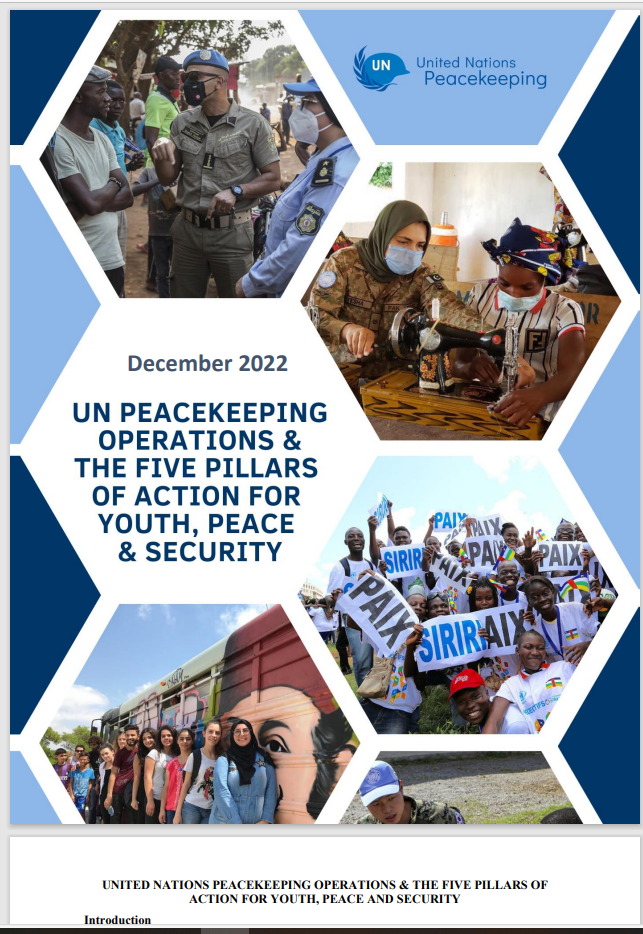
United nations peacekeeping operations & the five pillars of action for youth, peace and security
UN peacekeeping operations have long recognized the significance of engaging youth in host countries and territories. Experience demonstrates that youth engagement has been critical when working with national authorities to promote and build more effective, responsive and accountable institutions in accordance with human rights standards. The marginalization of young people catalyzes human rights grievances and often fuels violence. For UN peacekeeping operations, there are numerous opportunities and entry points for working with youth when implementing a wide range of priorities such as community engagement; gender equality; human rights; access to justice; support to political processes; conflict management; community-oriented policing; disarmament, demobilization and reintegration; mine action; security sector reform; community violence reduction and reconciliation. Youth inclusion in decision-making and political processes as key stakeholders, promotes sustainable peace and development.
After decades of experience engaging youth, this area of UN peacekeeping was elevated to a strategic priority following the establishment in 2015 of the Youth, Peace, and Security (YPS) agenda by the Security Council through Resolution 2250 (2015). In doing so, the Council defined youth as persons between the ages of 18 and 29 and identified five pillars for action: prevention, protection, participation, partnerships, and disengagement and reintegration. It also requested the Secretary-General to submit a progress study on youth’s positive contribution to peace processes and conflict resolution. In 2018, “The Missing Peace: Independent Progress Study on Youth, Peace and Security” was published to wide acclaim, further propelling the international community’s interest to consider youth in the maintenance of peace and security.
Two subsequent YPS resolutions were adopted by the Security Council – S/RES/2419 (2018) recognized the important role of youth in solving and preventing conflicts and called on all relevant actors to include young people in all aspects of peace processes. S/RES/2535 (2020) affirmed the commitments made in UNSCR 2250 (2015) and UNSCR 2419 (2018), but also for the first time acknowledged young people’s positive contributions to the “sustainability, inclusiveness and success of UN peacekeeping and peace building efforts.” It also recognized the challenges faced by youth “including gender inequalities that perpetuate all forms of discrimination and violence, and persistent inequalities that put young women at particular risk.” Resolution 2535 urged UN peacekeeping operations to implement context-specific strategies on YPS. In keeping with this mandate, several strategies that address YPS priorities have been developed and vary from facilitating inter-generational community dialogue in South Sudan, to encouraging recruitment of young people into the police force in Darfur, to initiating projects to decrease the effects of climate change in Cyprus.
The importance of youth engagement in mission mandates and the institutionalization of the YPS agenda are on the rise in most missions, although more work is needed to fully integrate YPS as a priority. Out of the twelve UN peacekeeping operations, seven mission mandates include reference to the significance of the YPS agenda and three missions (UNMISS, UNMIK and UNFICYP) have policies and planning frameworks that feature YPS. Furthermore, YPS coordination mechanisms have been established at UN Headquarters and in eleven missions, comprising a global network of YPS focal points for UN peacekeeping. Technical guidance tools have been developed to support UN peacekeeping staff in implementing the agenda, including: the YPS Programming Handbook for UN practitioners , Integrated Disarmament, Demobilization and Reintegration Standards’ module on youth, DPKO/DFS Guidelines on Engagement with Civil Society, the Peacekeeping practice note on community engagement and the United Nations Community Engagement Guidelines on Peacebuilding and Sustaining Peace.
These documents coherently stress the importance of including all segments of society in mandated activities and join a body of resources commonly used by both uniformed and civilian UN peacekeeping personnel to guide their work. In 2022, the second Report of the Secretary-General on the implementation of the YPS agenda was published.4 To complement the Report, the UN Secretariat produced several thematic papers. As one of them, this paper provides a snapshot of UN peacekeeping activities undertaken within the context of the five pillars for action, as identified in SCR 2250 (2015). More work is still required across the Peace and Security Pillar, as well as with other stakeholders working on YPS, to effectively articulate what are the expected outcomes of implementing the YPS Agenda in peacekeeping settings and what kind of indicators would need to be tracked to measure progress and impact. This work will allow follow-up reports to focus on results achieved towards the broader goals of the YPS Agenda itself.
Read full article:UN Peacekeeping Operations & The Five Pillars
Disclaimer: Third-Party Content
This article was originally published by the United Nations Peacekeeping All rights remain with the original author(s)/publisher. The views expressed are theirs and do not reflect those of RYCO and the granting authority.
If you are the copyright owner and believe this content has been shared in a way that violates your rights, please contact us at comms@rycowb.org, and we will promptly address your concerns.

Philippine National Action Plan on Youth, Security and Peace (NAPYPS 2023-2033)
The Philippine National Action Plan on Youth, Peace and Security or NAPYPS is a 10-year plan that details key action points strengthening the meaningful participation of young people in peacebuilding, governance, protection of human rights, and the implementation of global and national sustainable development agenda. NAPYPS is the first youth-led and multi-stakeholder driven national policy on youth, peace and security in the country.
Read full article:Philippine National Action Plan on Youth, Peace and Security
Disclaimer: Third-Party Content
This article was originally published by the Office of the Presidential Adviser on Peace, Reconciliation, and Unity (OPAPRU) and the Deutsche Gesellschaft für Internationale Zusammenarbeit (GIZ) GmbH through the Youth for a Culture of Peace and Non-Violence in Mindanan’ (YOUCAP) Project. YOUGAP is commissioned by the German Federal Ministry for Economic Cooperation and Development (BMZ) und implemented by GIZ. All rights remain with the original author(s)/publisher. The views expressed are theirs and do not reflect those of RYCO and the granting authority.
If you are the copyright owner and believe this content has been shared in a way that violates your rights, please contact us at comms@rycowb.org, and we will promptly address your concerns.

Youth, Peace, and Security
Young people comprise the largest percentage of the global population (UN), and most young people live in the global south (Das Gupta et. al., 2014). In the peace, security and development fields, the importance of understanding the diverse lived experiences of youth is often highlighted in relation to the fact that over 400 million young people aged 15 to 29 live in a state or province where armed conflict or other organized violence took place in 2016; 23 % of the global youth population are affected, in some way, by armed conflict or other organized violence (Hagerty, 2017).
New research and policy discourses are beginning to highlight the multifaceted ways that young people contribute to, and influence, processes of world politics, peace and security: as agents in formal and informal economies and peace processes, through nonviolent mass movements, and as community organizers and political activists, for example. After a brief historical context and discussion of the state of literature, this chapter describes key debates and future challenges in the field of youth, peace and security
Read full article:Altiok, Ali, Berents, Helen, Grizelj, Irena
Disclaimer: Third-Party Content
This article was originally published by Ali Altiok, Helen Berents, Irena Grizelj, and Siobhan McEvoy-Levy. All rights remain with the original author(s)/publisher. The views expressed are theirs and do not reflect those of RYCO and the granting authority.
If you are the copyright owner and believe this content has been shared in a way that violates your rights, please contact us at comms@rycowb.org, and we will promptly address your concerns.
Berents, Helen. “Power, partnership, and youth as norm entrepreneurs:
Getting to UN Security Council resolution 2250 on youth, peace, and security.” Global Studies Quarterly 2″, no. 3 (2022): ksac038.
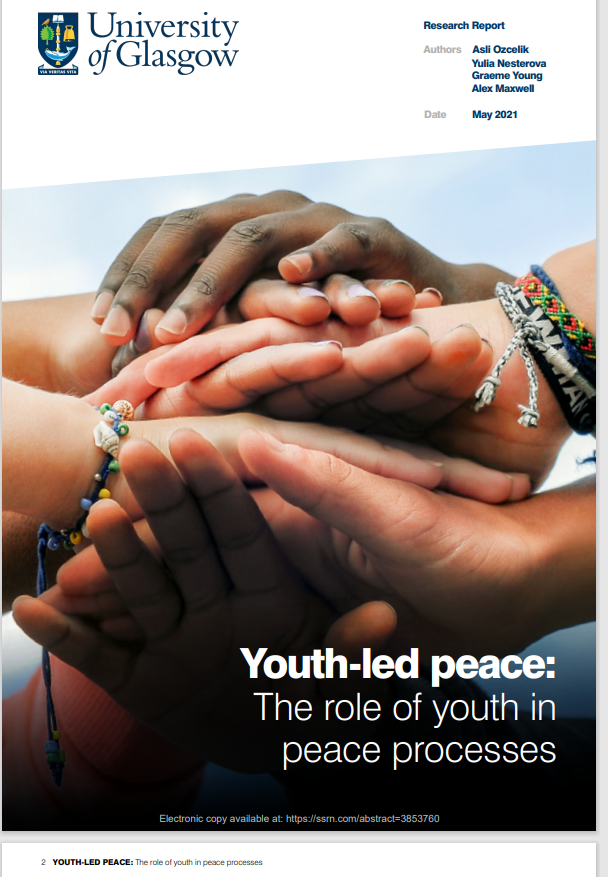
Youth-led peace: The role of youth in peace processes
More than 600 million young people live in fragile and conflict-affected contexts (Wilton Park, 2017). Despite being deeply affected by violence in a myriad of ways, young people’s voices are not heard, nor included in the processes of conflict resolution and peacebuilding. The ‘youth bulge’ is seen as a driver of instability, and young people are typically portrayed as perpetrators of violence or potential ‘spoilers’ who should be protected from radicalisation and extremism (see, for example, OECD, 2011). The active role young people play as peacemakers, mediators and peacebuilders at grassroots and local levels are under-acknowledged and they are often not included in official peace processes. Beyond peacebuilding, young people display ownership, agency and leadership in diverse areas that are of significance to local, regional, national and international peace and security, ranging from climate change to tackling inequalities. Yet, the achievements of young people are hindered due to the absence of adequate recognition, protection, funding and meaningful partnerships.
This report highlights the key themes, findings and recommendations of the project Youth-led peace: The role of youth in peace processes led by the University of Glasgow. The objectives of the project were to:
Read full article:Ozcelik, Asli, Yulia Nesterova, Graeme Young, and Alex Maxwell. “Youth-led peace: The role of youth in peace processes.”
Disclaimer: Third-Party Content
This article was originally published by the University of Glasgow as an output of the project “Youth Led Peace: The Role of Youth in Peace Processes”. The project was carried out by Dr Asli Ozcelik (Principal Investigator), Dr Yulia Nesterova (Co-Investigator) and Dr Graeme Young (Co-Investigator) with the research assistance of Mr Alex Maxwell. All rights remain with the original author(s)/publisher. The views expressed are theirs and do not reflect those of RYCO and the granting authority
If you are the copyright owner and believe this content has been shared in a way that violates your rights, please contact us at comms@rycowb.org, and we will promptly address your concerns.

YPS POLICIES
YPS POLICIES

Strengthening Peace and Security in High Schools: Insights from the Student Council Conference
Amidst Kosovo*’s ongoing efforts to build a cohesive and inclusive society, the need to address peace and security in schools has become a priority. The Kosovar Youth Council (KYC) held the transformative Student Council Conference on Peace and Security, an initiative aimed at empowering young leaders, fostering dialogue among diverse student groups, and tackling systemic challenges in educational settings. The outcomes of this conference—focused on actionable policy recommendations—provide a roadmap for creating safer, more inclusive schools across Kosovo.
Building Connections and Addressing Challenges
The event opened with an acknowledgment of the unique challenges faced by schools across Kosovo. Participants were organized into working groups to discuss three thematic areas: Challenges, Policies, and Interventions. Discussions highlighted significant concerns, including:
Actionable Recommendations
Based on the insights from the conference, the following detailed recommendations were developed, highlighting responsible stakeholders and implementation strategies:
1. Strengthen Mental Health Support:
2. Develop Inclusive Policies:
3. Enhance Reporting Mechanisms:
4. Improve Infrastructure and Safety Measures:
5. Foster Community Engagement:
6. Address the Parallel Education System:
Outcomes and Future Steps
The conference’s immediate outcomes included the drafting of the Student Council Peace and Security Policy Recommendations and a collaborative Action Plan. These documents outline strategic steps to:
Conclusion: Recommendations for Moving Forward
The insights and actionable recommendations from this conference provide a clear framework for addressing systemic challenges in Kosovo’s schools. Key priorities include:
- Establishing comprehensive mental health support systems to address the root causes of conflict and stress in schools.
- Developing inclusive policies and curricula that promote tolerance and bridge societal divides.
- Enhancing infrastructure and adopting modern safety measures to ensure secure learning environments.
- Empowering student councils and fostering community engagement to sustain progress over time.
- Addressing the barriers created by the parallel education system to unify students and promote shared understanding.
By implementing these strategies, Kosovo can take significant strides toward creating schools that are not only safe and inclusive but also nurturing grounds for future leaders. The Kosovar Youth Council remains committed to supporting these initiatives and ensuring that the voices of students continue to shape the future of education in Kosovo.
* This designation is without prejudice to positions on status and is in line with Security Council Resolution 1244 and the ICJ Opinion on the Kosovo Declaration of Independence.
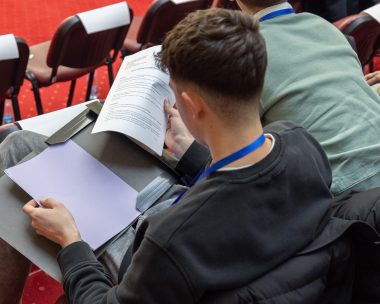 | 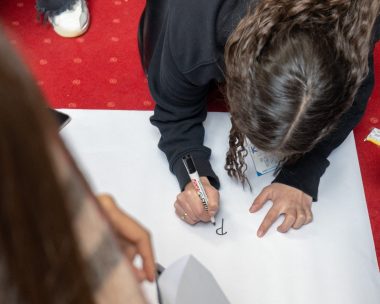 |
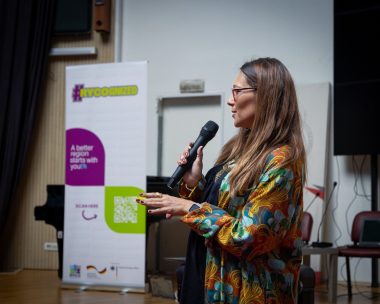 | 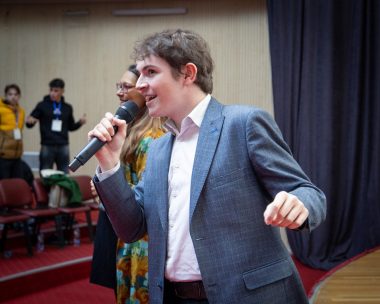 |

Strengthening Peace and Security in High Schools: Insights from the Student Council Conference
The Kosovar Youth Council (KYC) held a transformative Student Council Conference on Peace and Security, a pioneering initiative aimed at fostering dialogue among diverse student groups, empowering young leaders, and addressing the pressing challenges in schools across Kosovo* . This conference brought together 150 student representatives, including participants from Serbian schools and other marginalized communities, aligning with the Youth, Peace, and Security (YPS ) agenda.
The Context of Peace and Security in Schools
Ensuring peace and security in schools is a global challenge that requires immediate attention and collaborative solutions. According to a 2023 UNESCO report, approximately 32% of student’s worldwide experience bullying at least once a month, significantly affecting their mental health and academic performance. In Europe, a 2022 Eurostat survey highlighted that 1 in 5 students reported feeling unsafe in their school environment, citing issues such as violence, harassment, and inadequate infrastructure.
In Kosovo, the situation mirrors global trends. A 2024 study by the Ministry of Education, Science, Technology, and Innovation revealed that over 40% of students in secondary schools identified bullying as a major concern. Additionally, inter-ethnic tensions remain a persistent challenge, exacerbated by the parallel education system. The same study reported that only 25% of schools have access to psychological support services, leaving a significant gap in addressing mental health issues among students.
Safety concerns extend beyond interpersonal conflicts. Reports indicate that incidents involving narcotics, weapons, and vandalism are on the rise in schools across Kosovo. A 2023 survey conducted by the Kosovar Youth Council found that 35% of students had witnessed or been aware of violent incidents in their school premises.
These statistics underscore the urgent need for comprehensive policies and interventions to create safe and inclusive learning environments. Addressing these challenges requires a multi-faceted approach involving students, educators, parents, and policymakers.
Building Connections and Addressing Challenges
The event opened with an acknowledgment of the unique challenges faced by schools across Kosovo. Participants were organized into working groups to discuss three thematic areas: Challenges, Policies, and Interventions. Discussions highlighted significant concerns, including:
Bullying and Harassment: Both peer-to-peer and teacher-related incidents were reported as widespread issues.
A student from Mitrovica captured the spirit of the discussions: “Safe and peaceful schools are the key to a bright future. We must work together to build environments where everyone feels secure and respected.”
Policy Recommendations and Action Plans
Through collaborative dialogue, students proposed innovative solutions to improve peace and security in schools. Key recommendations included:
A participant from Gjilan suggested, “Awareness-raising campaigns and Peace Clubs can help us overcome divisions and build stronger, safer communities.”
Notable Interventions and Initiatives
Working groups also outlined practical interventions to address these challenges:
A student from Peja highlighted the need for comprehensive efforts, stating: “Together with parents, teachers, and local authorities, we can create a framework that ensures safety and supports learning for all students.”
Outcomes and Future Steps
The conference’s immediate outcomes included the drafting of the Student Council Peace and Security Policy Recommendations and a collaborative Action Plan. These documents outline strategic steps to:
Conclusion: Empowering Youth as Agents of Change
The Student Council Conference demonstrated the power of youth-led initiatives in addressing systemic challenges. By providing a platform for dialogue and collaboration, KYC empowered young leaders to take proactive roles in fostering peace and security in schools. The insights and recommendations from this conference will serve as a foundation for ongoing efforts to create safer, more inclusive educational environments across Kosovo.
A participant summarized the spirit of the event, saying, “Let’s practice motivation and love, not discrimination and hate.”
KYC remains committed to supporting these initiatives and ensuring that the voices of students continue to shape the future of education in Kosovo.
This designation is without prejudice to positions on status and is in line with Security Council Resolution 1244 and the ICJ Opinion on the Kosovo Declaration of Independence.
Youth, Peace and Security Agenda is all about mainstreaming youth opinion and participation in policy and peace dialogs. As a supporter of the YPS Agenda in the region, RYCO provides the space for youth to express their opinions and solutions for sustainable peace. However, views and opinions expressed are those of the author(s) only and do not necessarily reflect those of the RYCO. Neither the RYCO nor the granting authority can be held responsible for them.
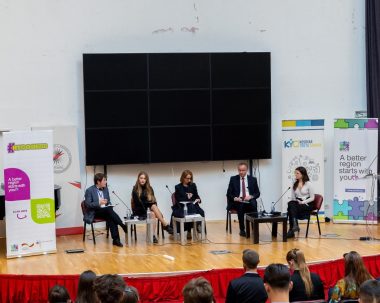 | 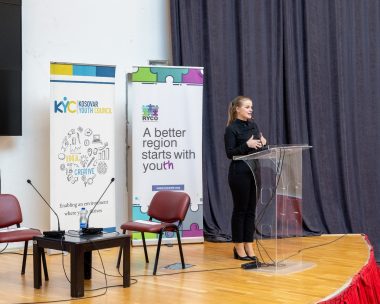 |
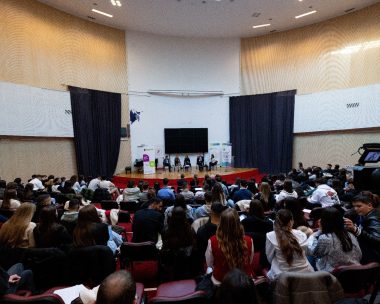 | 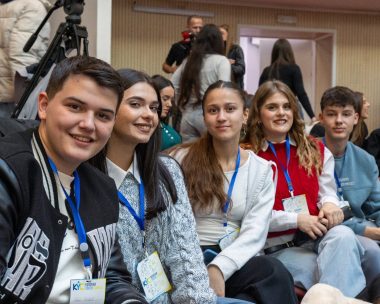 |

National Action Plan for Peace and Security in Schools in Kosovo
Vision
To create a safe, inclusive, and cohesive educational environment in Kosovo* where every student is empowered to thrive academically and socially, free from violence, discrimination, and systemic barriers.
Goals
- Foster mental health support and resilience in schools.
- Develop inclusive education policies that promote tolerance and understanding.
- Enhance safety infrastructure and reporting mechanisms.
- Strengthen community engagement in addressing peace and security issues.
- Bridge divides caused by the parallel education system.
Pillars of the Action Plan
Pillar 1: Strengthening Mental Health Support
Objective: Address mental health challenges and provide support mechanisms for students and staff.
Action 2.1: Introduce peace and tolerance education in school curricula.
Action 2.2: Establish Peace Clubs in all schools.
Pillar 2: Inclusive Education Policies
Objective: Promote equality and respect through curriculum and student-led initiatives.
Action 2.1: Introduce peace and tolerance education in school curricula.
Action 2.2: Establish Peace Clubs in all schools.
Pillar 3: Enhancing Safety Measures and Reporting Mechanisms
Objective: Ensure secure school environments through modern infrastructure and effective reporting systems.
Action 3.1: Install security cameras and emergency systems in schools.
Action 3.2: Develop anonymous digital reporting platforms.
Pillar 4: Community Engagement
Objective: Strengthen partnerships among students, parents, teachers, and local authorities to sustain peace and security measures.
Action 4.1: Organize regular student-parent-teacher meetings.
Action 4.2: Launch joint community initiatives (e.g., workshops, campaigns).
Pillar 5: Addressing the Parallel Education System
Objective: Promote integration and understanding between Albanian and Serbian students.
Action 5.1: Develop joint extracurricular activities (sports, arts, cultural exchanges).
Action 5.2: Facilitate joint teacher training sessions.
Monitoring and Evaluation
- Progress Reports: Quarterly updates from schools and municipal directories.
- Student Feedback: Biannual surveys to gauge policy impact.
- Stakeholder Review: Annual national review meetings.
- Key Performance Indicators (KPIs):
- Percentage of schools with full-time psychologists.
- Reduction in reported incidents of bullying and violence.
- Number of joint activities between parallel education systems.
Conclusion
This National Action Plan for Peace and Security in Schools provides a comprehensive framework for addressing the systemic challenges faced by Kosovo’s education system. Through collaboration among students, educators, policymakers, and the community, the plan aims to create safer and more inclusive schools. Its success hinges on sustained commitment and collective effort to empower Kosovo’s youth as agents of positive change.
* This designation is without prejudice to positions on status and is in line with Security Council Resolution 1244 and the ICJ Opinion on the Kosovo Declaration of Independence.
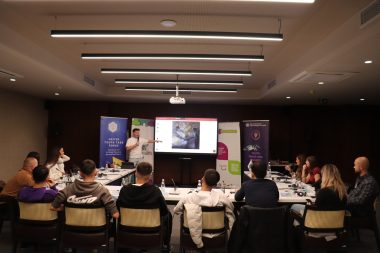

Advancing the Youth, Peace, and Security Agenda: Local Actions Across the Western Balkans
Efforts to localize the Youth, Peace, and Security (YPS) agenda across the Western Balkans have brought together youth, civil society, and policymakers to address regional challenges through “RYCOGNISED YPS Advocacy Efforts in WB6” Project. These initiatives, led by RYCO in collaboration with youth councils and local organizations, focus on fostering inclusion, peacebuilding, and active youth participation in shaping a secure and united future. The “RYCOGNIZED – Enhancing peacebuilding and reconciliation in WB6” project contributes to the continuation of the “RYCOGNIZED” of 2023 and it serves to enhance RYCO’s advocacy efforts and institutional capacities in the Youth Peace and Security (YPS) Agenda in the region. The project supports RYCO’s effort to create an enabling environment in the Western Balkans for peacebuilding, regional youth cooperation, and improving the position of youth. Among the activities implemented under this project are also the local activities supporting the establishment of the local YPS architecture in WB6 through NYCs and the development of the Peace Capital methodology. “RYCOGNIZED – Enhancing peacebuilding and reconciliation in WB6” is financed by the German Ministry of Foreign Affairs and WB6 Governments.
Albania
In Albania, Youth, Peace, and Security (YPS) initiatives, jointly implemented by the National Youth Congress (NYC) and the United Nations Association Albania (UNAA), are empowering youth and civil society organizations (CSOs) to take an active role in peacebuilding.
NYC led two key research efforts to strengthen the YPS agenda. The first study, Mapping CSOs: Role, Challenges, and Perceptions, analyzed the capacities of CSOs to promote youth participation in peace processes, offering actionable insights aligned with UNSCR 2250. The second, Digitalization and AI in YPS: “Next-Gen Policy”, explored how digital tools and AI can revolutionize youth engagement, emphasizing innovative solutions for underserved communities.
These findings were amplified through advocacy campaigns and focus groups in Tirana, Lezha, and Elbasan, engaging 30 young participants. UNAA and NYC further advanced the agenda with Peace Week 2024, a five-day event that included hybrid panel discussions and a YPS Network Meet-Up. Over 100 participants and 20+ stakeholders discussed themes such as youth-led peacebuilding, education, and digital technology’s role in conflict prevention.
Participants emphasized the need for sustainable strategies and coordination, underscoring that “Peace is about building trust and creating spaces for meaningful participation.”
These efforts highlight the transformative potential of collaboration in advancing the YPS agenda in Albania.
Bosnia and Herzegovina
Bosnia and Herzegovina efforts were focused in a capacity-building program on equipping civil society organizations with tools to understand and promote the YPS agenda, particularly the youth participation pillar. This initiative directly engaged 27 young people from diverse regions, training them to serve as multipliers in their communities.
To make these concepts accessible, the program developed innovative tools, including a board game designed to teach young people about youth organizing. Additionally, methodological documents were created to monitor the implementation of the youth law, ensuring accountability and transparency.
To make these concepts accessible, the program developed innovative tools, including a board game designed to teach young people about youth organizing. Additionally, methodological documents were created to monitor the implementation of the youth law, ensuring accountability and transparency.
Iman Maslić, President of the Youth Council of the Federation of Bosnia and Herzegovina, emphasized, “Empowering youth through the YPS agenda is not just about shaping the future; it’s about giving young people a seat at the table today”
Next steps to be planned include translating these materials into local languages, developing new tools for engaging youth, and continuing promotional activities.
Kosovo*2: Building Bridges Through Dialogue and Creativity
Kosovo’s activities underscored the importance of inclusivity and interethnic dialogue. The Student Peace and Security Conference, held in collaboration with the Kosovar Youth Council, brought together 174 students from diverse ethnic backgrounds, including representatives from non-majority communities and schools operating under the Serbian system. The event fostered mutual understanding and equipped participants with advocacy skills to promote peace and security initiatives in their schools and communities.
A memorable moment occurred during a panel discussion on “Peace and Security in High Schools,” Anes, a student representative from North Mitrovica, answered a question, after which a student from South Mitrovica in the audience extended an invitation, saying:
“How come we live in the same city, and we have never played football? That is a shame. Let’s organize and do that.”
Another initiative, “Friendship Through Photography”, engaged 16 young people in capturing themes of peace and diversity through photography. Participants proposed organizing an exhibition of their work and expanding the initiative to explore daily life and challenges across communities.
Montenegro
In Montenegro, diverse activities were undertaken to advance the Youth, Peace, and Security (YPS) agenda, tailoring efforts to Montenegro’s specific context. Guided by the “Analysis of the Implementation of YPS in Montenegro”, LBO MNE collaborated with partners like the Youth Network of Montenegro, the Council of Europe’s School of Political Studies, and the OSCE Mission to enhance youth engagement and stakeholder cooperation.
Key Activities:
LBO MNE will continue fostering youth-led implementation of the YPS agenda by building bridges between young people, decision-makers, and civil society. Focus areas include capacity-building for stakeholders and creating sustainable partnerships to ensure the agenda’s long-term impact.
North Macedonia: Mapping Peace and Security Ecosystems
The multistakeholder event “Youth Connect: A Dialogue for Peace and Security” in Krusevo (December 11–13, 2024) gathered 25 participants to identify critical factors and relationships within the peace and security ecosystem in North Macedonia and the wider Western Balkans. Using a system-mapping approach, participants examined youth involvement in peacebuilding, analyzing barriers such as youth unemployment, ethnic tensions, and limited opportunities for decision-making.
One participant reflected,
“I consider North Macedonia to be relatively safe, but there are still real security risks that need to be addressed. Some groups, such as women, face more significant challenges.”
Others noted that high youth unemployment fuels frustration and reduces optimism about the future.
The event’s key outcome was a comprehensive system map, aimed at integrating peace and security initiatives into strategies and policies. The local branch office will continue engaging diverse stakeholders to promote YPS values in policymaking.
Serbia
Serbia’s efforts centered on localizing UN Resolution 2250 and empowering youth as peacebuilders.Events in towns like Cicevac, Pancevo, and Nis were tailored to meet the unique needs of participants.
The workshops emphasized the five pillars of UN Resolution 2250—participation, protection, prevention, partnerships, and reintegration. Participants also contributed to the Regional Peace Capitals Initiative, which seeks to establish symbolic peace hubs across the Western Balkans.
The Youth, Peace, and Security (YPS) agenda across the Western Balkans has demonstrated the transformative power of youth-led initiatives in fostering peace, inclusion, and regional cooperation. Through research, advocacy, and creative engagement strategies, these efforts have brought together diverse stakeholders, empowering young people as key agents of change in their communities. Each initiative demonstrates the value of tailoring approaches to local needs while ensuring broader regional alignment. By addressing systemic challenges and amplifying youth voices, these programs emphasize the collective responsibility of governments, institutions, and communities to create opportunities for meaningful participation and shared progress.
2* This designation is without prejudice to positions on status and is in line with Security Council Resolution 1244 and the ICJ Opinion on the Kosovo Declaration of Independence.
 | 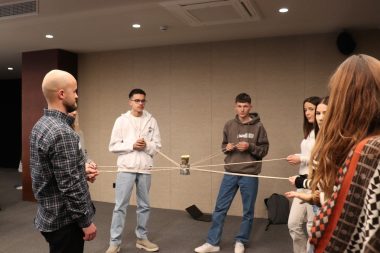 |
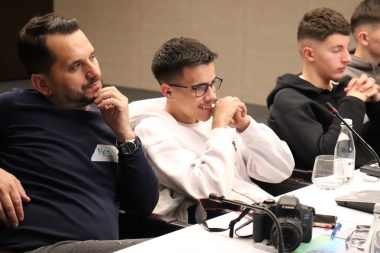 | 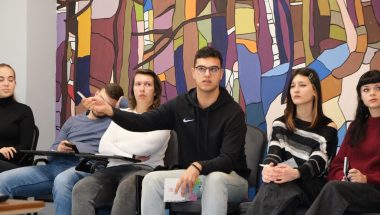 |
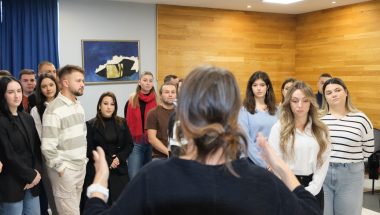 | 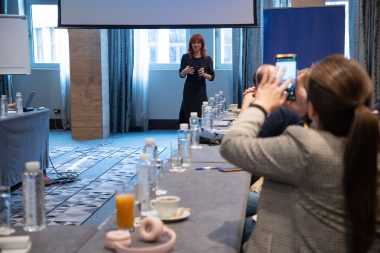 |
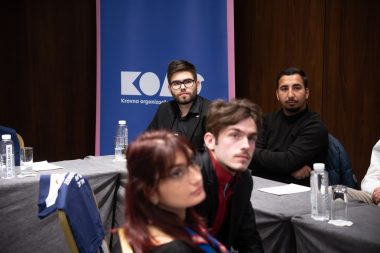 |

YPS Regional Academy successfully concluded in Tirana
Tirana, December 7, 2024 – The Youth, Peace, and Security (YPS) Academy successfully concluded its third and final module at the Hotel Tirana International, uniting representatives from governmental institutions, regional organizations, and national youth councils from across the Western Balkans. Hosted by the Regional Youth Cooperation Office (RYCO), the two-day module provided a platform to strengthen knowledge, foster dialogue, and advance regional cooperation on the YPS agenda.
Evis Myftari, YPS Academy Project Manager reflected in her opening remarks on the program’s journey:
“The YPS Academy started just last year, and while we are still a small group, we’ve laid the groundwork for something transformative. This initiative has the potential to grow, enabling us to support youth-driven actions first at the local level and, eventually, across the region. Through these efforts, RYCO aims to empower young people to take the lead in shaping the future of peace and security.”
Kreshnik Loka, Head of RYCO’s Local Branch Office in Albania, highlighted the Academy’s significance:
“The YPS Academy is an important step in linking our roles and the work we do with our communities, making the invisible visible. Policies must evolve to reflect the dynamic needs of our generation, especially youth. It is crucial that those shaping policies ensure they are adaptable, inclusive, and responsive to young people’s realities.”
The first day of the program featured interactive workshops and discussions. Participants revisited mutual values and lessons learned from previous modules, followed by sessions focused on mapping regional YPS priorities and exploring implementation strategies. These activities created a space for collaboration and exchange, enabling participants to align on a shared vision for advancing the YPS agenda. On the final day, discussions centered on RYCO’s informal YPS network of focal points, with participants strategizing the next steps for strengthening the network’s capacity and outreach.
RYCO Secretary General Albert Hani, joined by Head of Programs Teodora Stolevska, emphasized the critical role of shared values and youth-led initiatives in building sustainable peace. In his closing remarks, Mr. Hani commended the participants for their dedication and awarded certificates of completion, officially marking the conclusion of the Academy’s inaugural edition.
“Your energy and ideas are the foundation for a brighter, more inclusive future. Together, we are building a generation that places peace and collaboration at the center of their work,” he stated.
RYCO extended its gratitude for their engagement and reaffirmed its commitment to empowering youth as key drivers of peace and security in the Western Balkans.
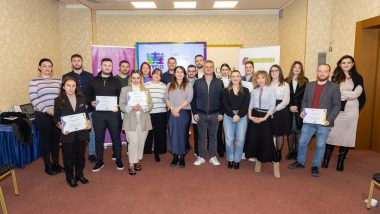 |  |
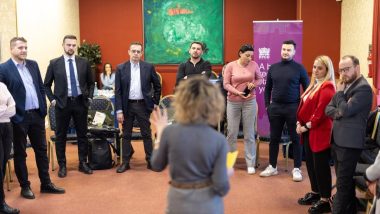 | |

Youth Leading the Way: RYCO Youth Talk Explores Cybersecurity and Peacebuilding in Belgrade
BELGRADE – RYCO LBO Serbia, in collaboration with the South-East Europe Dialogue on Internet Governance (SEEDIG) and the OSCE Mission to Serbia, hosted the RYCO Youth Talk: Navigating the Digital Frontier: Youth, Peace, and Cybersecurity on Saturday, November 25, 2024, in Belgrade.
This Youth Talk was organized within the SEEDIG Youth School, which gathered 30 talented young people across the SEE, and explored the intersection of the Youth, Peace, and Security (YPS) Agenda and cybersecurity. It emphasized the vital role of youth in addressing digital challenges while fostering peace and reconciliation in the Western Balkans and SEE region.
The panel, consisting of Mr. Đorđe Krivokapić, professor at the Faculty of Organizational Studies, and co-founder of the SHARE Foundation, Ms. Staša Ivković, president of the NGO OsnaŽene, and Alisa Kockar, program coordinator at the national Youth Council of Serbia (KOMS), provided insights into critical cybersecurity issues affecting young people, such as the role of state and non-state actors in cyber threats, the risks of digital violence faced by youth activists, and the complexities of regulating online spaces. Panelists emphasized the need for enhanced digital literacy, careful regulation, and collaboration between governments, tech companies, and youth organizations to create safer online environments.
The interactive discussion addressed key questions, including the role of youth in advocating for inclusive digital spaces and the impact of cybersecurity threats on peacebuilding processes. Participants also explored ways to equip young people with the skills to counter misinformation, cyberbullying, and online extremism effectively.
The event concluded with a call to action for young people to take an active role in shaping a secure digital future while advancing the YPS Agenda. This Youth Talk reaffirmed the commitment of RYCO and its partners to fostering youth-led initiatives that build resilience against cyber threats and promote peace in the region.
 |  |
 | |

Youth Leading the Way: RYCO Youth Talk Explores YPS and Digital Rights in Tirana
TIRANA – The Local Branch Office of RYCO in Albania, in collaboration with SCiDEV, hosted the RYCO Youth Talk: YPS and Digital Rights on Friday, October 4, 2024, at Europe House in Tirana.
The second edition of Youth Talk explored the intersection of Youth, Peace, and Security (YPS) and Digital Rights, highlighting the critical role that digital rights play in empowering youth to lead peace and security initiatives.
The event was opened by Mr. Kreshnik Loka, Head of RYCO’s Local Branch Office in Albania, and Ms. Orkidea Xhaferaj from SCiDEV. Mr. Loka emphasized the significant connection between Digital Rights and security, acknowledging the vital contribution of young people as leaders in managing and addressing security challenges. The YPS Agenda itself underscores the importance of youth engagement in peacebuilding and security processes, positioning them as central to driving these efforts forward.
Ms. Flutura Brakaj, RYCO’s Local Program Officer, provided a comprehensive overview of the YPS Agenda and its core principles. This was followed by a session on Digital Rights: Skills and Responsibilities, led by Ms. Iris Shehaj from SCiDEV and Mr. Maend Kullaj, a Young Digital Ambassador. Together, they shared practical examples and insights into the responsibilities that accompany digital rights in today’s world.
The event concluded with an engaging youth-led discussion focused on the importance of collective action in creating a more peaceful and secure future for the region. A role-play exercise centered on a major cyber security breach sparked thoughtful dialogue about the critical role youth play in preventing such incidents. The discussions touched on key areas such as digital infrastructure, national security, economic and social stability, and the protection of digital rights, highlighting the proactive role young people can take in safeguarding these sectors through awareness and informed action. It also reinforced the importance of digital rights—such as access to information, freedom of expression, and privacy—as essential tools for young people to advance the YPS Agenda and become agents of change in the digital age.
This Youth Talk also served as a key moment to also introduce the upcoming YPS local initiatives, tailored to Albania’s specific context, which RYCO’s Local Branch Office in Albania will implement in collaboration with the National Youth Congress of Albania.
 |  |  |
 |

Exploring Youth Peace and Security – Creating a change
Srebrno jezero – RYCO LBO Serbia together with the OSCE Mission to Serbia and Faculty of Political Sciences, University of Belgrade organized for the second year in a row Capacity Building Training on Srebrno jezero, from 7th to 10th Jun 2024, that was designed to empower students in developing projects focused on the Youth Peace and Security agenda.
Throughout the training, participants explored various stages of project proposal development, from understanding project design logic to diving into gender mainstreaming. Engaging activities, among which was Participation game provided hands-on experience, while sessions on Youth Peace and Security (YPS) pillars and projects and insights from donors broadened perspectives and inspired innovation. Training provided an invaluable opportunity for students to YPS, develope their project proposals the students’ project ideas, enhancing their potential to create positive change in their communities. This is a sucessful continuation of cooperation between RYCO LBO SRB, the OSCE Mission to Serbia, and FPN Master’s studies in Peace, Security, and Development.
The Youth, Peace and Security (YPS) Agenda established by the United Nations Security Council Resolution (UNSCR) 2250 in 2015 recognises the inclusion and participation of young people as a key dimension of building and sustaining peace and security for all. It called upon governments, international organizations, civil society, and other stakeholders to work together to support youth’s active role in promoting peace and preventing violence. One of the strategic objectives of RYCO Strategy 2022-2024 is in line with and will promote the Youth Peace and Security Agenda through activities and mechanisms which will contribute to its broader goals, working towards a more inclusive, peaceful, and prosperous future for young people in the region.



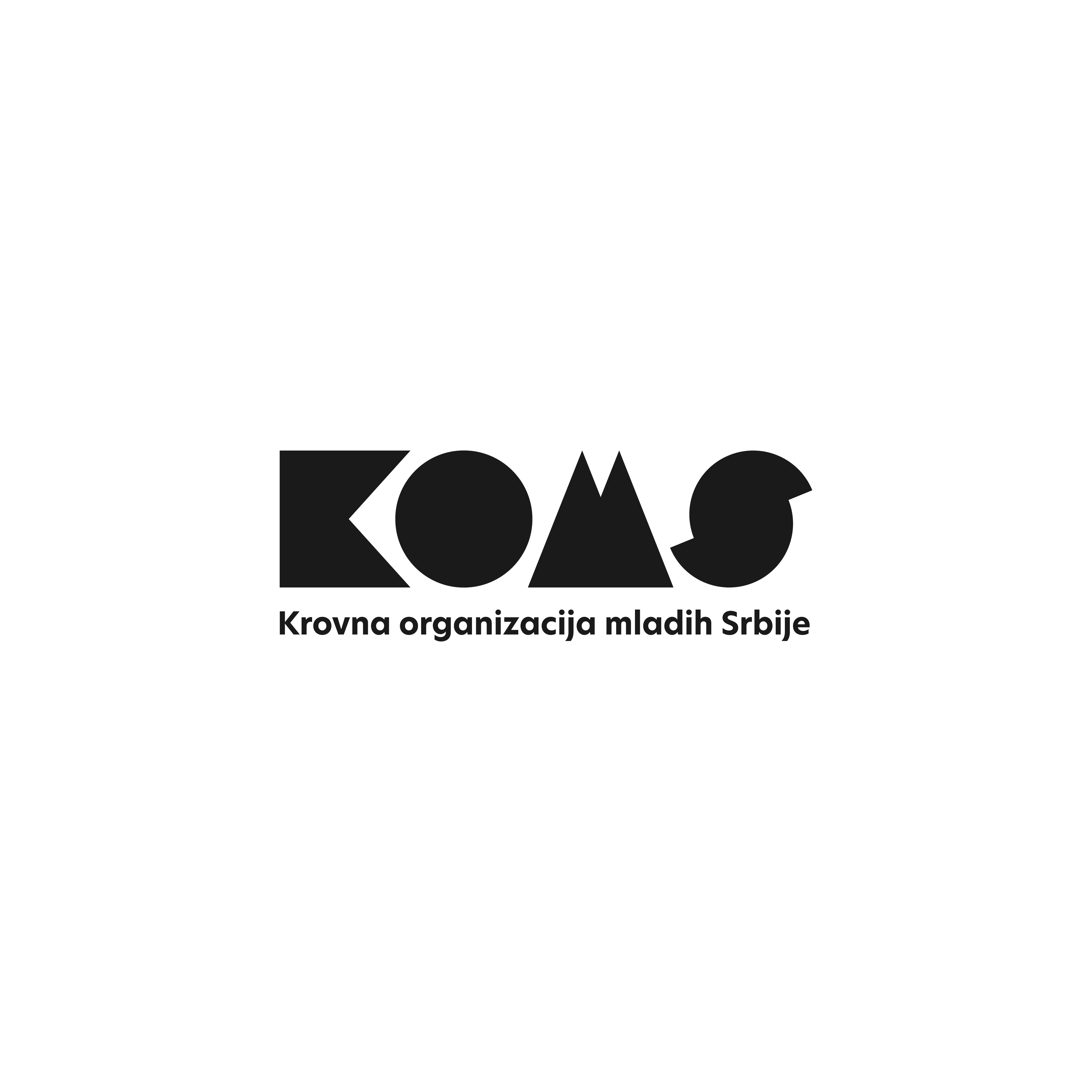
KOMS and the YPS Agenda
National Youth Council of Serbia – KOMS leads the charge in implementing the Youth, Peace, and Security (YPS) agenda in Serbia, showcasing expertise and dedication. With thier innovative programs and strategic partnerships, KOMS sets the standard for youth-focused peacebuilding initiatives, inspiring positive change not only in Serbia, but in the region as well. So let’s see how KOMS achieves that!
Introduction to KOMS and its vision
KOMS is an association of 109 youth and for youth organization and is the highest independent representative body of youth in Serbia. KOMS is an advocacy platform which serves for improving the position of youth and acts as a link between young people, its member organizations, various decision-makers and providers of programs and services for youth. It operates through a network of youth organizations across the country, advocating for youth rights and participation in decision making processes. Through the Alternative Report on the position and needs of youth which KOMS has been doing annually since 2017, data is collected and trends concerning youth are tracked, particularly in the areas of peace and security, as well as those about neighborly relations. KOMS is a leading youth organization in Serbia that is committed to promoting peace, security, and youth empowerment.
At the heart of KOMS’ overarching vision resides the principle of youth inclusion, a resolute dedication to amplifying the voices of youth all over Serbia. Each decision within KOMS bears the hallmark of ensuring the meaningful participation and representation of these voices in decision making processes, and in particular peacebuilding. Another strength of KOMS lies in its strategic partnerships, which extend far beyond its immediate sphere. KOMS creates and cultivates alliances with national and international entities, including RYCO, UN agencies, NGOs, Government institutions and youth organizations.
However, KOMS recognizes that lasting change necessitates more than empowerment alone – it demands advocacy and policy influence. Armed with empirical data and unwavering determination, KOMS advocates for policy reforms and institutional restructuring aimed at addressing the root causes of conflict. Within the core of KOMS, we can find a narrative of resilience, collaboration, empowerment, and advocacy, and in this narrative, the past serves as a prologue, and the future points to a situation where peace is not merely an abstract ideal but a tangible reality. We give you an overview of KOMS’ activities related to promoting and implementing the YPS Agenda in Serbia.
The beginnings of YPS implementation in Serbia
In the early stages of YPS implementation in Serbia, KOMS embarked on a strategic journey marked by dedication for creating more peaceful and sustainable society in Serbia, but also across the Western Balkans region. One of the first steps we took was to sign a Declaration of Commitment to implement the YPS Agenda with the Youth Congress of Albania – KRK. With this Declaration, KOMS and KRK express their commitment to implement the guiding principles of the YPS Agenda and recognize that the key importance of a joint proactive role in carrying out the mission of building a safe, peaceful, and stable environment for youth in Albania and Serbia, with the aim of promoting inclusiveness, cooperation, peacebuilding, and mutual respect.
Awareness Campaigns emerged as another approach, created to reach diverse audiences. Through extensive campaigns targeting youth, policymakers, and civil society stakeholders, KOMS illuminated the significance of the YPS Agenda. Leveraging an array of channels including social media, consultations with relevant stakeholders and youth, as well as public events, these efforts fostered dialogue and raised awareness on the existence of the Agenda, its contents and principles, and possible ways of its implementation. Complementing these campaigns were capacity building trainings designed to empower youth and youth organizations. With a focus on YPS Agenda education and skill development, KOMS equipped young participants with the tools and knowledge needed to actively engage in peacebuilding efforts. These workshops served as catalysts for meaningful action, nurturing a generation of informed and empowered changemakers.
Policy advocacy emerged as a central pillar of KOMS’ efforts, driving engagement with key stakeholders at various levels. Through strategic dialogue with government institutions, international organizations, and other relevant actors, KOMS advocates for the integration of youth perspectives into peace and security policies and for the implementation of the YPS Agenda in Serbia. Through membership in various councils (Youth Council, Gender Equality Council, and Civil Society Council) and working groups in the drafting and amendments of numerous normative-strategic documents, we advocate for the implementation of the YPS Agenda through cross-sectoral cooperation and the inclusion of youth as a key working principle. Armed with research and advocacy campaigns, KOMS works tirelessly to influence decision-makers, ensuring that youth voices were not only heard but also acted upon in policy formulation and implementation.
The basis of these efforts was a meticulous research “Youth for Peace and Security: Analysis of the UN Agenda in the context of Serbia”, aimed providing an overview of current public policies (laws, strategies, action plans), and institutions responsible for youth in Serbia, which encompass in their work the specific objectives of the YPS Agenda. The research aims to determine whether and how the objectives of the YPS Agenda are implemented in current public policies of Serbia, and to define the space where it’s necessary to dedicate greater attention to their implementation at the national level. By collecting data and conducting this in-depth analysis, KOMS provided a solid foundation for evidence-based advocacy and policy recommendations. Through this research-driven approach, KOMS remains at the forefront of efforts to address the needs and concerns of youth, paving the way for a more inclusive and secure future.
Conclusion
KOMS is dedicated to empowering young people as agents of positive change and peacebuilders in Serbia and the Western Balkans region. Through its multifaceted approach, KOMS promotes the Youth Peace, and Security Agenda, fosters youth leadership, and contributes to building resilient and inclusive societies where youth is empowered enough to participate. KOMS remains committed to advancing peace, security, and sustainable development, with a focus on amplifying youth voices, priorities, and leadership on the national and international stage. Want to hear more about what KOMS does for youth in Serbia and the region? Find us at @komsmladi on social media!
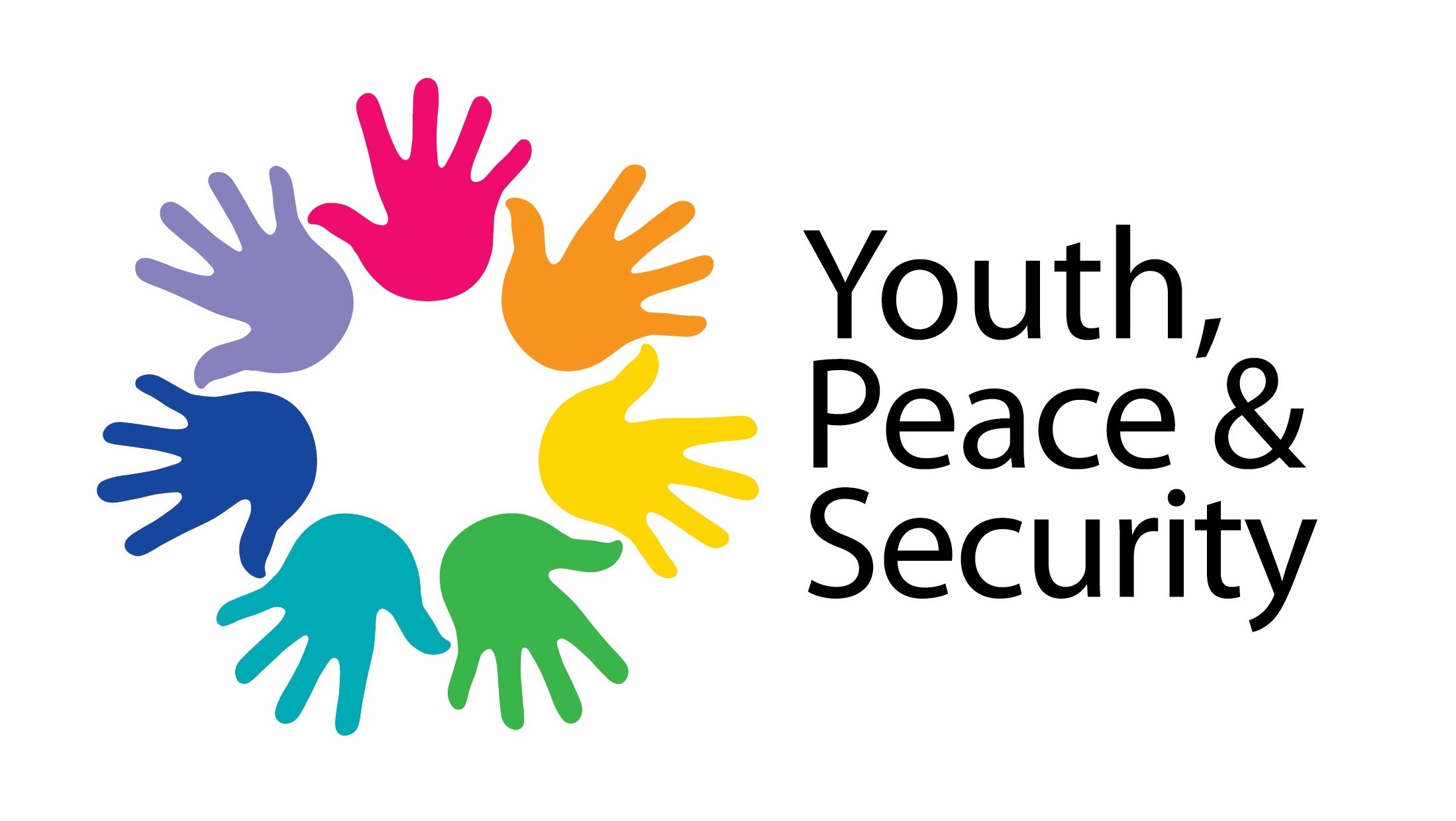
Youth, Peace and Security Agenda Presentations
Below, you’ll find a selection of presentations brimming with insightful content on Youth, Peace, and Security (YPS). These talks delve into the crucial intersection of youth engagement and global peace efforts, offering valuable perspectives and practical strategies for fostering positive change. Whether you’re passionate about activism, conflict resolution, or community empowerment, these presentations are tailored to inform and inspire. Dive into topics ranging from youth-led initiatives to the role of technology in promoting peace, each offering a unique lens through which to explore the transformative potential of youth in building a more peaceful world.
UN YOUTH, PEACE, AND SECURITY AGENDA 101
The Influence of Gun Violence on Youth Security in Serbia
Harmonizing Cybersecurity Initiatives Safeguarding Children Online
Verities and Challenges Faced
by Young Women in the Context of Gender-
Based Digital Violence
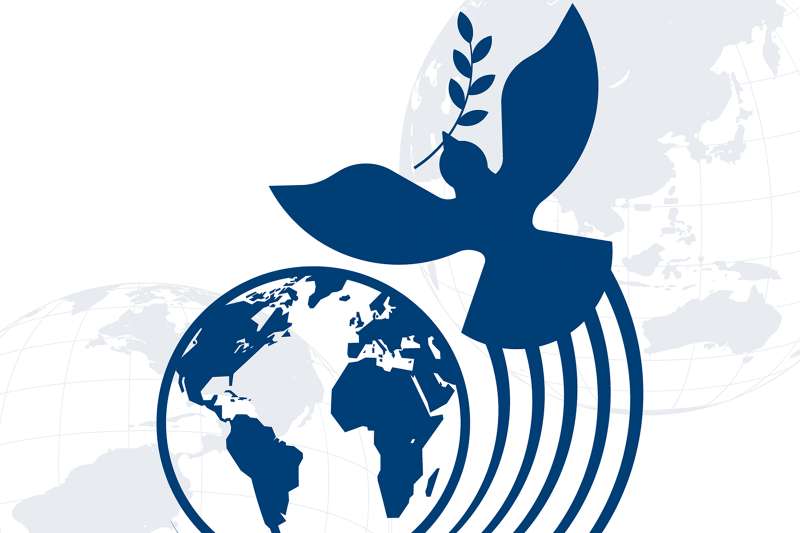
Building Inclusive and Peaceful Communities
In a reality where the world is captured by conflicts, which more and more seem to be far from over, the phrase “peacebuilding” holds the key to finding a compromise and finally a long-term solution. The Western Balkans have always had their fair share of wars by being one of the main hotspots of conflict in Europe. Our countries are always aiming towards joining the EU, but the strains and wounds of the past are still making an impact, which can only by changed by the young people of the Western Balkans, as they are the ones who hold the keys to the future.
2.
The stability of our region in the past years has been fragile and a prone to outer influences, which shows the need for us to build stronger connections between our communities, starting from the young generation. The youth of the Western Balkans should find the way put differences aside and commit to a cooperative and vital work that lies ahead of us with the aim of transforming the region and our countries.
While bilateral issues may persist in the future, striving for a reality devoid of all challenges may not be realistic. However, these issues can be addressed through cooperation and bilateral dialogue. Our region’s youth possesses the capability to work together, building bridges instead of tearing them down. By acknowledging our differences while focusing on our shared values and aspirations, we can forge a path toward lasting peace and prosperity.
3.
When discussing peacebuilding and the importance of forgiveness as a pathway to a prosperous future, real-life examples can offer invaluable insights. A recent visit to Japan through the MIRAI program, which aims to foster mutual understanding among future leaders, provided me with a profound opportunity to witness firsthand the resilience and reconciliation of the Japanese people in the aftermath of World War II.
Visiting the Hiroshima Peace Memorial Museum, I was confronted with the harrowing realities of war, particularly the devastating impact of the atomic bomb. Yet, amidst the testimonials of destruction, I was struck by the Japanese people’s remarkable ability to move beyond the trauma of the past and focus on building a brighter future.
During a Peace Tour, our guide, a second-generation survivor of the Hiroshima bomb, shared a poignant message passed down from his grandfather: ‘Promise me one thing. You have to make friends everywhere you go, and then, how can you drop bombs on your friends?’
This reflection on Japan’s journey from suffering to prosperity underscores the transformative power of forgiveness and reconciliation. In the Western Balkans, where historical wounds and tensions persist, there is much to learn from Japan’s example. If we are to truly aspire to lasting peace and stability in our region, we must embrace a similar mentality of building strong relationships and looking towards the future, even amidst our differences.
If Japan learned how to live and build from being captured in a dark reality, the Western Balkans can also understand to populate this beautiful region by being good neighbors to each other, because we like it or not, we will be here forever, sharing the seas, mountains, roads and more.
4.
The goal for young people of the Western Balkans should be to understand the potential of the future rather than just coming to peace with the scars of the past. In order to achieve a European reality in the Balkans while maintaining our unique identities, youth cooperation is essential.
Youth exchanges are a powerful way of creating the foundation for future peaceful communities. These exchanges promote face-to-face connection, collaboration, and mutual understanding among young people from different backgrounds. Young people have the power to overcome stereotypes, cultivate empathy, and create lasting relationships across national borders through shared experiences.
Furthermore, youth empowerment initiatives are essential for maximizing the potential of intelligent individuals in the Western Balkans. These programs enable young leaders to contribute their insights and promote positive change in their communities and beyond by offering opportunities for exposure and idea exchange.
About the author: Elvis Çaushaj, a final year journalism and communication studies student from Albania, is a dedicated advocate for peace and inclusivity in the Western Balkans. With over two years of experience in the media industry, he also participates in various youth initiatives and currently serves as a member of the Youth Council of Tirana. Through his commitment to storytelling and community engagement, Elvis strives to contribute to positive change and foster dialogue among diverse communities in the region.
*Youth, Peace and Security Agenda is all about mainstreaming youth opinion and participation in policy and peace dialogs. As a supporter of the YPS Agenda in the region, RYCO provides the space for youth to express their opinions and solutions for sustainable peace. However, views and opinions expressed are those of the author(s) only and do not necessarily reflect those of the RYCO. Neither the RYCO nor the granting authority can be held responsible for them.
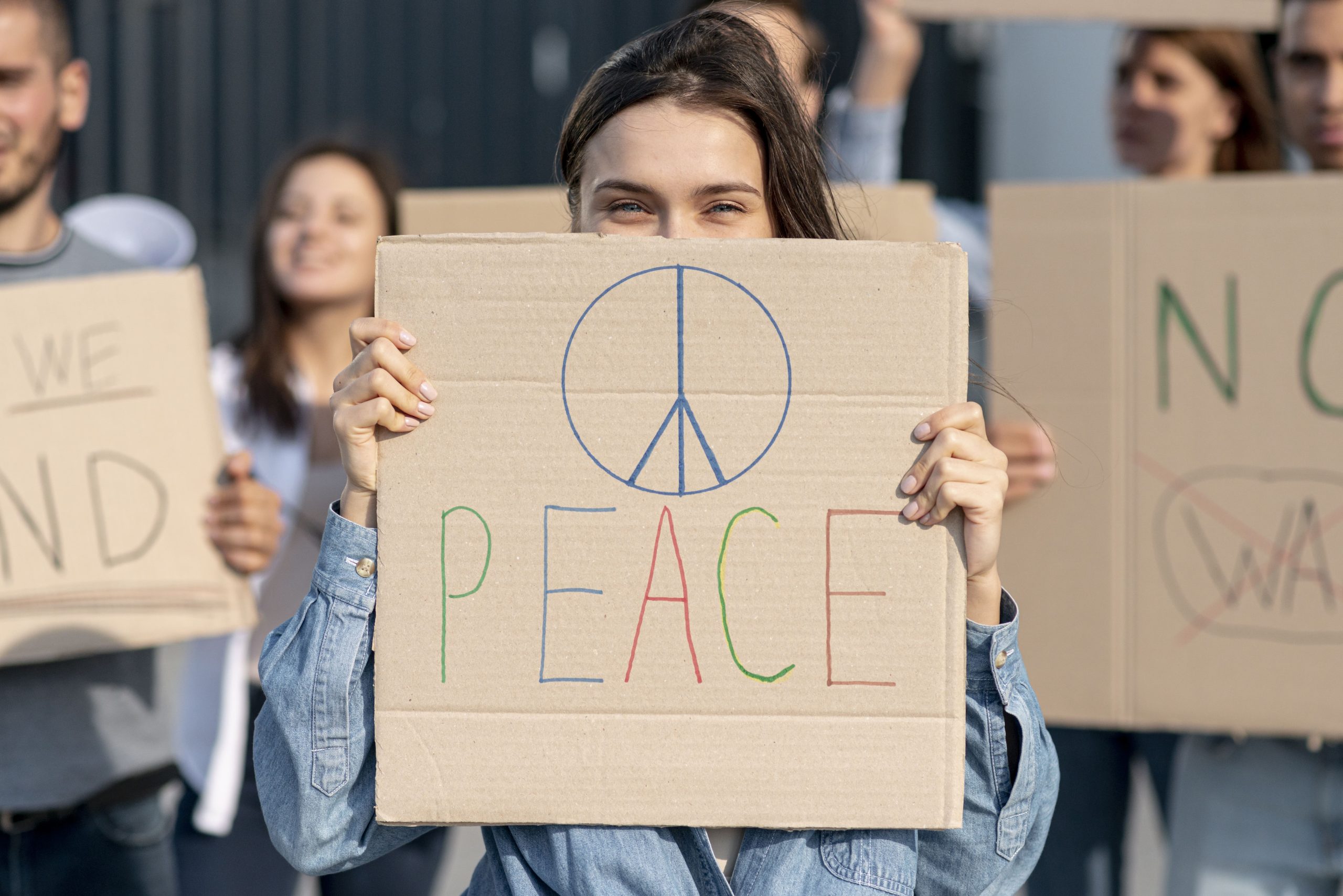
The Integral Role of Women in Peacebuilding Processes: A YPS Perspective
As the world grapples with various conflicts and humanitarian crises, the role of women in peacebuilding processes has become increasingly prominent. Their unique perspectives, experiences, and contributions are invaluable in fostering sustainable peace and security. As the Serbian UN Youth Delegate, I had the privilege of addressing the Global Peace Women’s Forum for International Women’s Day, where I emphasized the critical importance of including women in peacebuilding efforts, particularly within the framework of the Youth, Peace, and Security (YPS) agenda. In this article, we will explore the significant role of women in peacebuilding processes, with a focus on how their involvement aligns with the YPS agenda.
Women play multifaceted roles in peacebuilding processes, ranging from conflict prevention and resolution to post-conflict reconstruction and reconciliation. Their involvement is essential not only for ensuring the inclusivity and effectiveness of peace efforts but also for addressing the root causes of conflicts and promoting sustainable peace. Research has shown that peace agreements are more likely to endure when women are actively engaged in their negotiation and implementation. In conflict-affected communities, women often bear the brunt of violence and displacement. However, they are also at the forefront of resilience and peacebuilding efforts. Empowering women economically, socially, and politically is crucial for building resilient communities and promoting peace. This includes providing access to education, healthcare, livelihood opportunities, and meaningful participation in decision-making processes. The Youth, Peace, and Security agenda recognizes the positive role that young people, including young women, can play in peacebuilding processes. It emphasizes the importance of youth participation, protection, and partnership in promoting peace and preventing conflicts. As a youth delegate representing Serbia, I have witnessed firsthand the enthusiasm and dedication of young women in advocating for peace and social justice. Their energy and innovative approaches are instrumental in shaping inclusive and sustainable peace efforts. Women’s leadership is central to the YPS agenda, as it reflects the principles of inclusivity, diversity, and empowerment. By amplifying the voices of young women in peacebuilding processes, we can address the root causes of conflicts, promote social cohesion, and build more resilient societies.
Moreover, investing in women’s leadership contributes to achieving the Sustainable Development Goals (SDGs), particularly Goal 5 on gender equality and Goal 16 on peace, justice, and strong institutions. Women play a crucial role in conflict prevention and resolution by employing various strategies to mitigate tensions and promote dialogue. Their unique perspectives and experiences enable them to identify early warning signs of conflict and initiate community-based peace initiatives. In conflict-affected regions, women often serve as mediators, negotiators, and peacebuilders, facilitating dialogue between conflicting parties and fostering reconciliation. In the aftermath of conflict, women play a vital role in post-conflict reconstruction and peacebuilding efforts. They are often at the forefront of efforts to rebuild communities, restore social cohesion, and promote reconciliation. Women’s participation in transitional justice mechanisms, such as truth and reconciliation commissions, ensures that the voices of survivors and victims are heard, and their rights are upheld. Moreover, women-led initiatives focus on addressing the specific needs of marginalized groups, including survivors of gender-based violence, internally displaced persons, and refugees.
Despite their significant contributions, women continue to face numerous challenges and barriers to their participation in peacebuilding processes. Gender-based discrimination, social norms, and cultural stereotypes often limit women’s access to decision-making spaces and undermine their credibility as peacebuilders. Moreover, women are disproportionately affected by conflict-related violence, including sexual and gender-based violence, which further impedes their participation in peace processes. Additionally, women’s organizations and activists face various structural barriers, including limited funding, inadequate resources, and institutionalized sexism. The lack of gender sensitive policies and mechanisms for women’s inclusion further marginalizes their voices and perpetuates gender inequalities in peacebuilding efforts. Addressing these challenges requires concerted efforts to dismantle patriarchal structures, promote gender equality, and ensure the meaningful participation of women at all levels of decision-making.
In conclusion, the role of women in peacebuilding processes is multifaceted and indispensable for achieving sustainable peace and security. Women’s leadership in conflict prevention, resolution, and post-conflict reconstruction contributes to building more inclusive, resilient, and peaceful societies. By recognizing and supporting the agency of women as peacebuilders, we can address the root causes of conflicts, promote social justice, and advance the goals of the Youth, Peace, and Security agenda. As the Serbian UN Youth Delegate, I remain committed to advocating for the meaningful participation of women in peacebuilding efforts and working towards a world where women’s voices are heard, valued, and respected in shaping our shared future.
Author: Tamara Marjanovic
Serbian UN Youth Delegate
*Youth, Peace and Security Agenda is all about mainstreaming youth opinion and participation in policy and peace dialogs. As a supporter of the YPS Agenda in the region, RYCO provides the space for youth to express their opinions and solutions for sustainable peace. However, views and opinions expressed are those of the author(s) only and do not necessarily reflect those of the RYCO. Neither the RYCO nor the granting authority can be held responsible for them.

Innovative Solutions on Conflict Resolution
Countries of Balkan Peninsula remain as the ones with the most complex political contexts all around the globe. Years of conflicts, continuous fights for human and civic rights in Former Socialist Republic of Yugoslavia that gathered 6 different Republics and many more nations in its constitution, highlighted needs for territorial independence and souveregnity, interethnic tensions, lack of political willingness to stimulate change, and many more, have all resulted in shaping the present of Balkans. This topic tends to tackle many international debates, but no one has yet found an answer that would be relevant to this situation, and thus successfully applied.
After many years of conflicts in BiH, Serbia, Kosovo* and even other countries of the Balkans, we are still not able to move forward as in many aspects, although our collective potential to shift the reality into another, better dimension is high. Currently, civil society organizations and intergovernmental entities are investing great efforts in area of conflict resolution, through direct investments in youth, policy-making, peacebuilding and dialogue projects that are aiding the creation of new, healthy narrative, restraining use of any derogatory language, hatred perspectives and nationalism-based biases. Taking into account the example of Kosovo, we can conduct an constructive observation of how initiative and willingness of young people to change their communities, countries and the world is an vital innovative solution in dealing with conflict resolution.
Kosovo, although small, has an impressive 80% of young people as part of its population coming across from diverse scope of ethnic and religious communities, as well as gender, sexual and other relevant backgrounds. This influences an rich ethnological, historical and traditional social relievo that can stimulate beautiful and remarkable happenings of great help to conflict resolution and conflict management itself. When given the funds, this 80% of total Kosovo’s population could immerse themselves into interesting educational experiences that could help them grow their own awareness on conflict issues that haven’t yet been handled. One of the common modules of activities used to foster understanding on importance of peacebuilding are cultural exchanges. Cultural exchanges, while they may not seem like that, can be very sensitive, sentimental and deep for those participating in them. In these type of activities, mainly designed for youth, participants are challenged to seek their inner truth – to reflect the way they feel towards reconciliation and if that is something that they would like to work on. Reflecting on this means that they are obliged to be honest, not to others, but to themselves. A good facilitator can make this work a long way. Cultural exchanges are typical, but demanding, as they influence change of opinions and feelings. However, this isn’t innovative solution towards conflict resolution, although it definitely brings progress to the current situation. What could be innovative is sparking change and revolutional spirit within young people as taking onto new, holistic approaches that could deal with past effectively.
Holistic approach would require taking a wide scope of emotions, opinions, perspectives, narratives and points of views accountable. By embracing a holistic approach to conflict resolution in the Balkans, we acknowledge the intricate web of emotions, opinions, perspectives, narratives, and points of view that contribute to the region’s complex history and ongoing tensions. Rather than solely focusing on policy-making or traditional peacebuilding methods, a holistic approach recognizes the importance of addressing the emotional wounds and psychological barriers that hinder progress towards reconciliation.
Dealing with the emotions of people affected by conflict is essential for sustainable peace. Trauma, anger, fear, and resentment linger long after the guns have fallen silent. Ignoring these emotions only perpetuates cycles of violence and division. Instead, innovative solutions must prioritize mental health support, counseling services, and trauma-informed interventions to help individuals and communities heal from past wounds.
Moreover, a holistic approach emphasizes the need for inclusive dialogue and participatory decision-making processes. By giving voice to marginalized groups, especially youth who represent the future of the region, we ensure that diverse perspectives are heard and valued in the pursuit of peace. This inclusivity fosters a sense of ownership and empowerment among those directly affected by conflict, making them active participants in shaping their collective future.
Furthermore, innovative solutions in conflict resolution should leverage technology and digital platforms to facilitate communication, bridge divides, and promote empathy across communities. Virtual reality simulations, online forums, and social media campaigns can create virtual spaces for dialogue, education, and reconciliation, transcending physical boundaries and historical animosities.
In essence, a holistic approach to conflict resolution in the Balkans recognizes that peace is not merely the absence of violence but the presence of justice, equality, and understanding. By addressing the emotional, social, and psychological dimensions of conflict, we can cultivate a culture of peace that transcends generations and paves the way for a more harmonious and prosperous future in the region.
*This designation is without prejudice to positions on status and is in line with Security Council Resolution 1244 and the ICJ Opinion on the Kosovo Declaration of Independence.
Author: Mila Mihajlovic
*Youth, Peace and Security Agenda is all about mainstreaming youth opinion and participation in policy and peace dialogs. As a supporter of the YPS Agenda in the region, RYCO provides the space for youth to express their opinions and solutions for sustainable peace. However, views and opinions expressed are those of the author(s) only and do not necessarily reflect those of the RYCO. Neither the RYCO nor the granting authority can be held responsible for them.
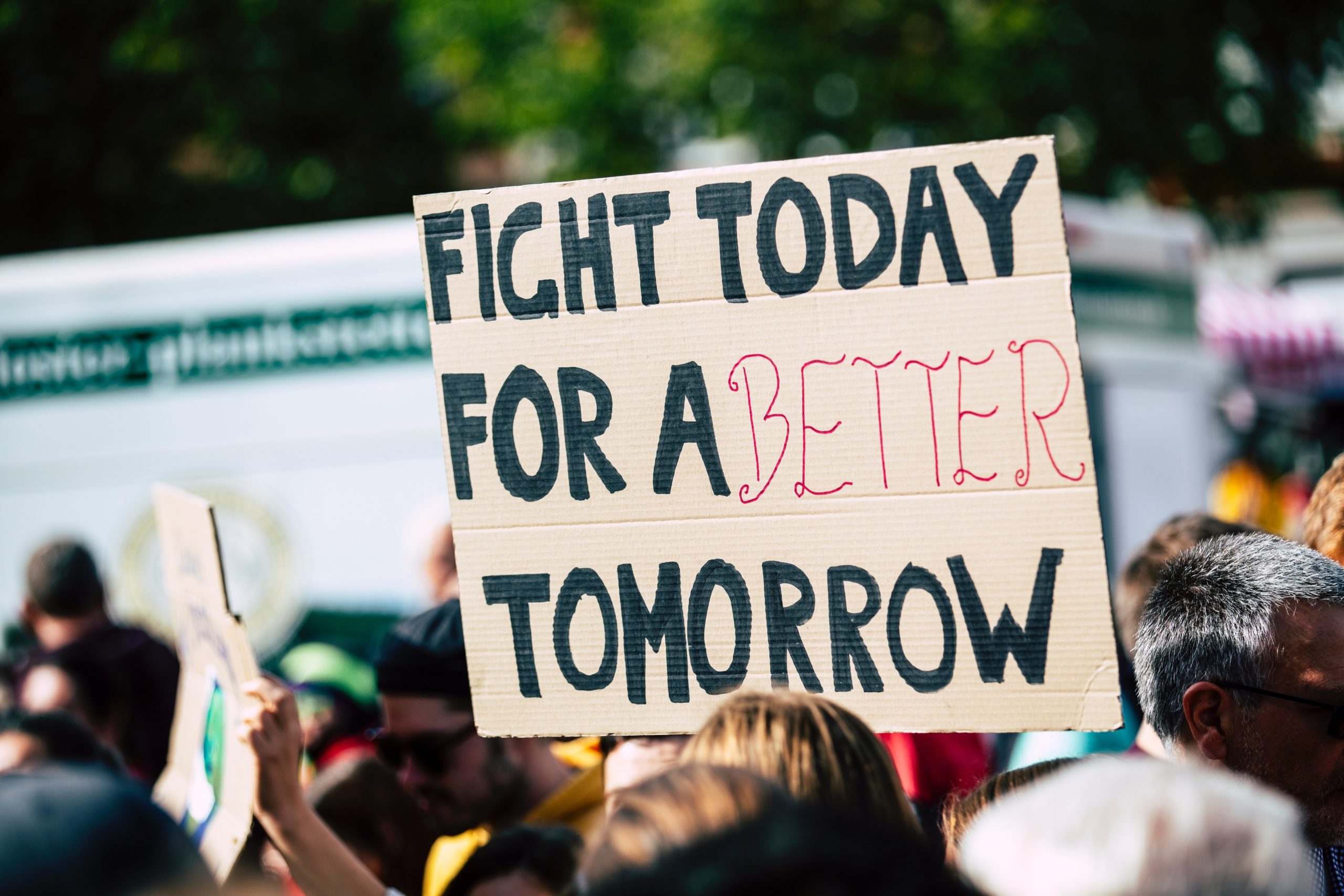
A short navigation through the role of young people into achieving peace and stability in the region
Time. Time is a notion, a concept that either heals, either deepens the wounds. The past is still fresh, and the events that took place – for many – is still a bad dream, a nightmare. If time was a rope, it would be a rubber band, that keeps stretching and stretching, but it will come a moment where one must let go, then it will all come back and hurt even more. On a more practical aspect, I’d say that making peace with yourself is the catalyst of a bigger change.
Taking stock. It literally means to think carefully of something. Why would I mention this? Following the analogy of the paragraph above, many young people fall under the influence of acutely rooted hate, through different narratives (where everyone is the victim) continuing a legacy of violence and conflict. This should be the moment where every young person takes stock and through a deep breath the reflection and reasoning take place. Although younger by age, youth can be the bigger person.
Examples. When I Googled this word, it gave me this meaning: “a particular situation, object, or person which shows that what is being claimed is true”. If it weren’t for French and German young people, the regions would to this day be in conflict. The Franco-German Youth Office (FGYO), “the most beautiful child of the Elysee Treaty” has brought together more than ten million young people – they have exchanged in more than 380,000 programmes. Between WB6, RYCO is the organization that is working towards bringing together young people, exchanging, sharing experiences and learning.
Collective paranoia. A neighbor of mine used to be very, very thrilled. He used to say that communism will come back and everything will go back to as it was. He wasn’t scared, no, he loved communism and with his “enlightening” ideas he had gathered a group of people – a collection of the same idealization: communism – and they used to spread this information. This affected other people as well, and everyone started becoming very paranoiac, nobody but them wanted dictatorship to come back. The same thing is happening with war as well, although it has erupted in different societies throughout the world, there is a lot of work happening into maintaining peace and stability in our region, therefore young people should always be aware that they are (have always been) the key. We must not let this collective paranoia spread, as it’s only going to bring back unhealthy memories and it’s going to affect in an unhealthy way.
Innovation. Introducing a new idea, tool, design or method. Thankfully there are more opportunities nowadays, the massive use of social media plays a crucial role into amplifying the voice of young people. As shown, youth can always come up with new, fresh approaches towards peacebuilding. One being a content creator, one being a writer, one being a diplomat, it is up to young people to create initiatives, raise awareness, promote dialogue and show that they are the most important stakeholders.
Education. Nelson Mandela once said: “Education is the most powerful weapon which you can use to change the world”. It plays a pivotal role in nurturing peace, advancing dialogue and preventing conflict. I recently saw a video, where young people in Japan didn’t even know that an atomic bomb was used in Hiroshima and Nagasaki. If we are talking about education as “forgetting the past” are we growing the right generations? My opinion is that the history should not be forgotten, we should be objective and the aim is to grow future generations with examples they should not take! Encouraging a culture of peace within schools, would mean to empower further generations into being righteous and active contributors to societal harmony.
To conclude, young people are the key actors into achieving peace and stability in the region. Their commitment, energy, creativity, potential and persistency are more than enough to grasp the aspirations of the past, present and future, heading towards a journey of endeavors rooted in the timeless quest for truth, connection, wisdom, and imagination. Young people inspire others to join them in the pursuit of a shared vision for a better world. And I have a question: should we waste any more time?
Author: Stiven Domi
*Youth, Peace and Security Agenda is all about mainstreaming youth opinion and participation in policy and peace dialogs. As a supporter of the YPS Agenda in the region, RYCO provides the space for youth to express their opinions and solutions for sustainable peace. However, views and opinions expressed are those of the author(s) only and do not necessarily reflect those of the RYCO. Neither the RYCO nor the granting authority can be held responsible for them.
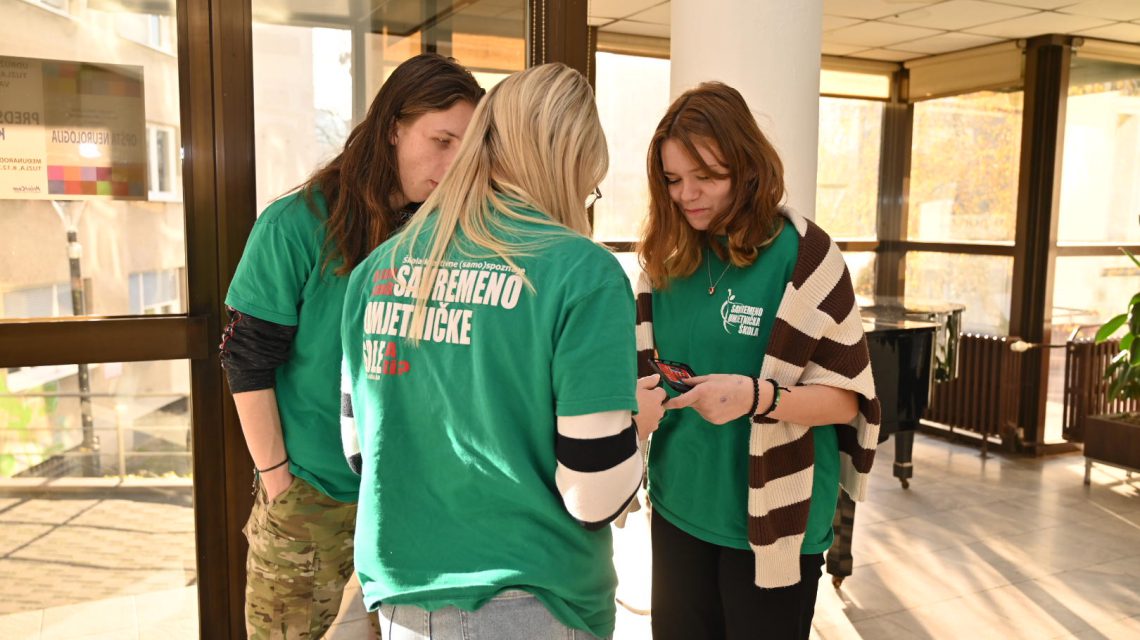
YPS goes locally in Bosnia and Herzegovina
Bosnia and Herzegovina – Recently, local activities in several cities in Bosnia and Herzegovina were organized as our team from LBO BIH visited Tuzla, Brčko, and Banja Luka. This is a continuation of the activities that started with the YPS MeetUp event in Sarajevo and the Capacity Building Training that was organized previously in Mostar.
As a prelude to this event, our team, together with UNFPA Bosnia and Herzegovina, hosted the Youth Voices for Peace event in Sarajevo on December 8, which focused on the YPS Agenda activities. Particularly in Bosnia and Herzegovina, discussions around the YPS Agenda are emerging, marking an essential step in addressing the residual impacts of the 90s war and the intergenerational trauma it inflicted. In response, UNFPA and RYCO joined forces to advance this dialogue and actively involve young people in peacebuilding. The initiative introduced a translated version of Resolution 2250 to initiate discussions, highlight ongoing efforts showcasing the capabilities of youth in addressing conflict aftermath, and examine youth policies for inclusivity. The event’s primary goal was to create a platform uniting media influence and policy-making to reinforce youth engagement in peace initiatives.
We then continued our activities in Tuzla, sometimes called the unknown NGO capital of Bosnia and Herzegovina. The city of salt was a meeting place with our Superschools, a meeting with representatives of the local administration, and two events with young people. After the introductory session and discussion about the YPS Agenda and the mapping of actors for its implementation, we also organized RYCO Youth Coffee Talks on the topic of Culture as a catalyst for change.
We continued YPS activities a day later in Brčko, where we met with representatives of the Brčko District Government, Youth Council of Brčko District, and young people, with whom we discussed the YPS Agenda, as in Tuzla, and organized RYCO Youth Coffee Talks on the topic of YPS Agenda as an instrument of social cohesion.
Our last stop was Banja Luka, where we organized another YPS MeetUp meeting with representatives of youth and youth organizations from Banja Luka and the Republika Srpska, in order to map out actors, activities, and needs regarding the implementation of the YPS Agenda. These events were followed by a series of meetings with representatives of the French Institute in Banjaluka and the Pedagogical Institute of the Republika Srpska.
Recognizing the complexity of the challenges addressed by Agenda 2250, RYCO is committed to adopting a multisectoral approach. By leveraging its resources and knowledge, RYCO will facilitate collaboration across various sectors to ensure a comprehensive and effective response to the diverse needs of youth in Bosnia and Herzegovina and in the region.
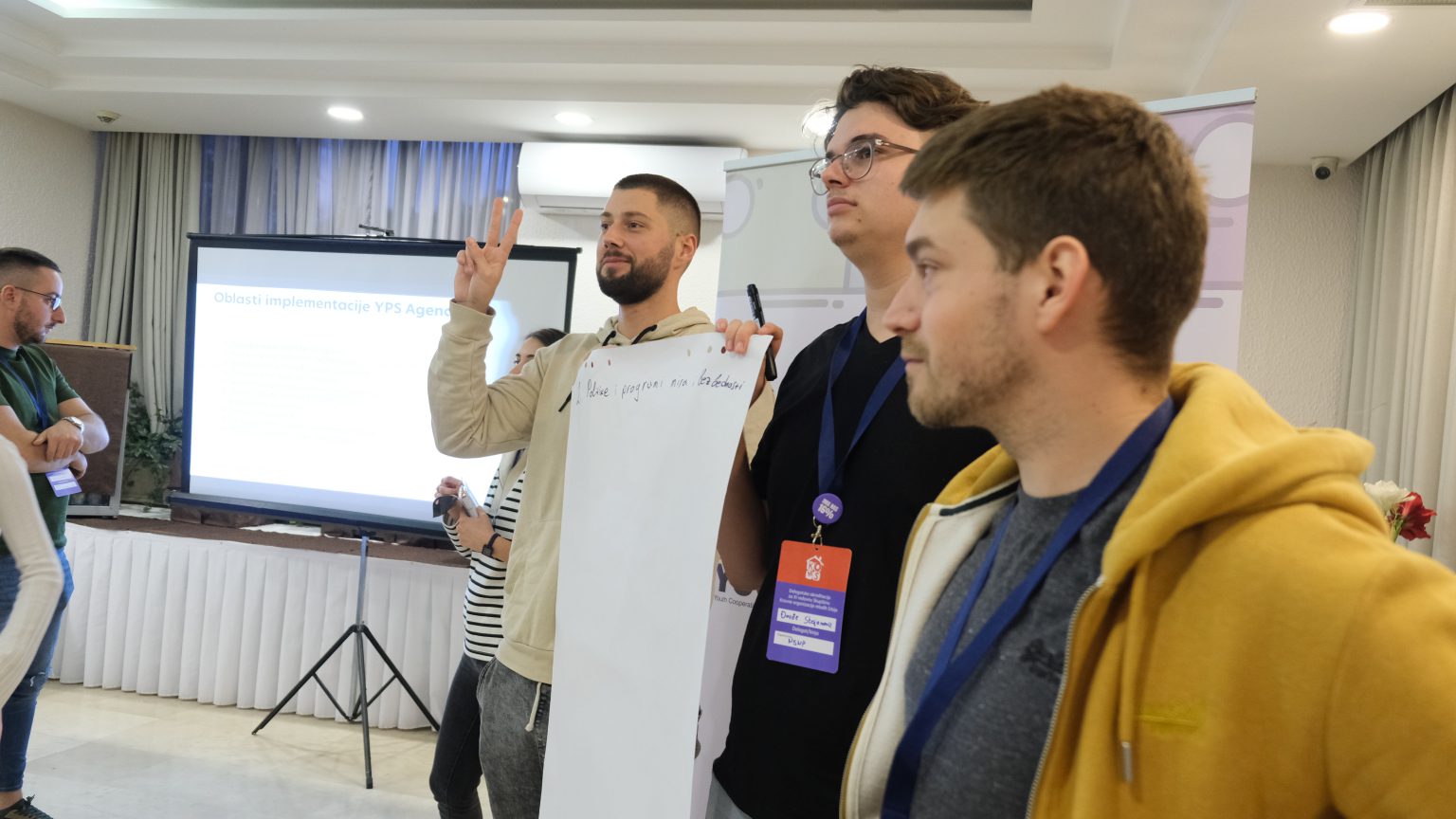
Youth in Serbia: Catalysts for Peacebuilding
Bajina Bašta- RYCO Local Branch Office in Serbia organized on 28th October 2023. the fourth Youth Talk this year that was focused on the UN Youth, Peace and Security Agenda. This event was co-organized with the National Youth Council of Serbia (KOMS) and took place in Bajina Bašta where the Annual KOMS Assembly was held.
More than 40 young people, representatives of youth organizations and organizations for youth from all parts of Serbia discussed priorities of YPS Agenda, presented what their organizations are doing on local level under this Agenda, what are their needs in order to build their capacities and further develop activities in order to be more efficient and sustainable. Opening remarks were given by Ms. Aleksandra Mihajlović, Program Assistant in KOMS and Ms. Ivana Markulić, Program Officer in RYCO LBO Serbia: they have familiarized participants with YPS Agenda priorities, core pillars and why its implementation is crucial for youth, their position and youth policy overall, not just in Serbia but in the whole Western Balkans region. Special focus was put on the local context, why peacebuilding and reconciliation processes are important and on which way these organizations are involved in it and on which level.
This introductory part was followed by group discussions that address main YPS implementation areas: youth policies and programs, policies and programs of peace and security, foreign policy and international cooperation, education, culture and art, economic and employment policy, justice and human rights policy, gender equality, healthcare policies, environmental protection and climate change, policies in area of science and technology. Participants have developed overviews of what is done in their communities regarding these program implementation areas and what should be done more, or modified or even kept as good practice. Conclusion of this Youth Talk was unanimous agreement that there is a need for joint actions, intersectoral and multisectorial cooperation and strategic approach towards implementation of UN YPS Agenda priorities in Serbia.
The aspiration to build an inclusive and just peace encouraged the adoption of the Youth, Peace and Security Agenda. Founded in United Nations Security Council Resolution 2250, the Agenda emphasizes the importance of involving youth in all phases of peacebuilding, from conflict prevention to rebuilding trust and cooperation after conflict. The development of the Regional Agenda for Youth, Peace and Security for the Western Balkans is one of RYCO’s strategic priorities until 2025. KOMS also works strategically at the local level to achieve the goals set in UN Agenda 2250 and together with the RYCO office in Serbia will work on the development and implementation of the Regional Agenda in the coming period.
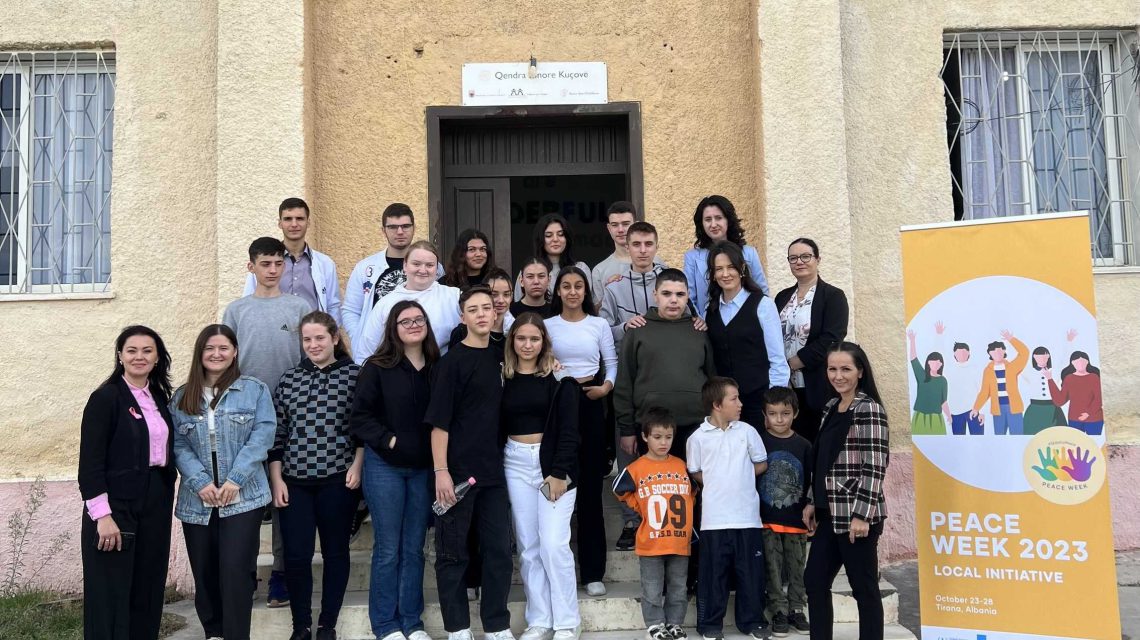
Skills for peace: Youth-Led Initiatives Shine in Peace Week 2023!
TIRANA- The RYCO Local Branch Office in Albania has actively supported the local initiatives of Peace Week 2023, a collaborative effort organized by the United Nations Association Albania (UNAA) in various cities across Albania from October 23 to October 29, 2023.
“Peace Week 2023” was a week-long event under the slogan of “Skills for Peace.” The local initiatives were designed to explore the concept and practice of peace from diverse perspectives and at various levels, primarily organized by young people themselves, community stakeholders, including informal youth groups and individuals.
This tradition of Peace Week focuses on fostering dialogue, youth engagement and advocacy, and the promotion of peaceful relations. The activities this year were held in Tirana, Tropoja, Lezhe, Pogradec, and Kucove, attracting the participation of several hundred young individuals from Albania.
The activities were diverse, ranging from raising awareness about cyberbullying at the grassroots level in Tropoja to promoting inclusiveness, dialogue, and collaboration through art in Pogradec. They also included reflections on peace and non-violence values through movie screenings in Tirana and fostering community activism and transforming relationships in Kucove. The event in Lezha focused on sports, encouraging teamwork, respect, and peaceful coexistence.
The event in Kucova was attended by Ms. Flutura Brakaj, RYCO’s Local Program Officer in Albania. She extended a warm welcome to the youth participants and organizers at the Youth Center, urging them to persist in their peace activism and the promotion of inclusivity. “We in RYCO always start at the very small levels and community levels, to then spread the vision and engagement further at regional levels, be that on change, cooperation, and peacebuilding efforts’ ” – she emphasized.
With the involvement of around 150 youth supporting peace initiatives and efforts at the local level, these young individuals have become catalysts for promoting peace and social cohesion within their communities.
The aspiration to build an inclusive and just peace aligns with the adoption of the Youth, Peace, and Security Agenda. This agenda, rooted in United Nations Security Council Resolution 2250, underscores the vital role of youth in all stages of peacebuilding, from preventing conflict to rebuilding trust and cooperation after conflicts. Developing the Regional Agenda for Youth, Peace, and Security in the Western Balkans is one of RYCO’s strategic priorities until 2025. In 2021, the United Nations Association Albania (UNAA) embarked on an initiative aimed at engaging young people in peacebuilding processes, conflict resolution, and fostering intercultural dialogue within Albania and the Western Balkans region. UNAA collaborates closely with the established National Network on YPS to fulfill the objectives outlined in UN Agenda 2250. Together with RYCO’s Local Branch Office in Albania, they are working on joint activities and empowering the network to enhance local-level work while exploring prospects for regional-level engagement.

Bottom-Up Securitization: Youth and Feminist Activists Combatting Misogyny in Serbian Tabloids
In September 2022, news about a serial rapist being released from prison after 15 years hit the headlines. Several media outlets started publishing information about the rapist’s name, criminal history, as well as images and physical descriptions of him, all while warning women to “watch out” and “beware”. This generated a great deal of concern among the general public as people started overwhelmingly sharing articles on social media about the rapist in question, Igor Milošević (I.M.), posting pictures of him and information on his whereabouts. The following days, the media also joined the “witch hunt”. Not long after, a Serbian Tabloid, Informer, known for its sensationalistic headlines, frequent spread of disinformation and hate speech, published a “mega exclusive” one-hour interview with the rapist. The interview triggered heaps of negative reactions on social media from the general public. A young feminist organization, Ženska solidarnost (Women Solidarity), organized several protests in front of Informer’s headquarters which gained immense support from other grass-root organizations, activists and public figures. The protestors demanded the complete removal of the interview, supervision of I.M., sanctions for Informer for publishing misogynistic content, spreading insecurity and fear among women etc. Eventually, I.M. was arrested, however, the interview remains available on Youtube, Informer was never sanctioned and there were no proactive measures.
Securitization theory
Securitization as a concept in security studies emerged in the 1990’s introduced by Ole Wæver, and further developed together with Barry Buzan and Jaap de Wilde, all representatives of the Copenhagen school (Buzan, Wæver & de Wilde, 1998). In their joint work the authors define security as “the move that takes politics beyond the established rules of the game and frames the issue either as a special kind of politics or as above politics” (ibid., 23). Therefore, securitisation is an act of presenting an issue as an existential threat thus moving it out of the domain of ‘normal’ political debate into the domain of emergency politics (Peoples & Williams, 2021: 116). The essence of the theory lays in the notion that security threats are socially constructed. Furthermore, it relies on social constructivism, as well as the Speech Act Theory derived from the field of linguistics (John Austin, 1962; John Searle 1969, 1979). Buzan et al. (1998: 26) compare the process of securitization with what is called a ‘speech act’ in linguistic theory, proposing that the sole usage of the utterance “security” is an act in itself. Furthermore, by uttering “security” in relation to a certain issue, decision makers attempt a “securitization move”, i.e., moving an issue on a spectrum from non-politicized further to politicized and finally to securitized (Peoples & Williams, 2021: 116). However, an issue cannot be completely securitized if there is no audience to accept it and consent to it as such (Buzan et al. 1998: 25).
Misogyny is common occurrence in the media (especially in the tabloids) in Serbia. Women are bullied, called out for their behavior, physical appearance, choices they make almost daily. The case of I.M. is an interesting one as it was the straw that broke the camel’s back which united woman into raising up against this injustice. In the initial phase, referring back to Salter’s scale, the attempt to securitize I.M.’s release achieved a medium high degree of success because the issue was accepted by the audience as a security one, and the public and media continued monitoring I.M.’s whereabouts as a preventive measure. Moreover, we can assess that the plot did fulfil Wæver’s felicity conditions: there was a traditional securitizing “plot”; the media warned about the threat (I.M.) being “historically threatening”; and some media included segments in the text where “experts” claimed that I.M. will rape again (Informer, 2022d; Nova S, 2022c). In the post-trigger phase, the bottom-up efforts to securitize the misogyny, violation of ethics, and the institutionals’ lack of interest to supervise and adequately punish rapists achieved a medium low degree of success. The issue has been problematized and accepted as a security concern, however, there were no proactive measures taken locally to address the problem. Two felicity conditions were met: the problem followed the traditional “plot”; misogyny has been always omnipresent in media throughout history; however, the securitizing actors did not have enough social capital to convince the authorities to take action. Informer on the other hand, as a media known to be affiliated with the leading establishment, had enough formal support to succeed in spinning the situation to their advantage and market themselves as saviors by contributing to the rearrest of I.M. In the end, the failure to address such systematic societal problems, and the protection of corrupt media are common symptoms of hybrid democracies where the needs of the rulers are often incompatible with those of the ruled. Despite these challenges, it becomes evident that the role of youth and feminist activism stands as a beacon of hope, tirelessly working to raise awareness and incite meaningful change within society.
Author: Katarina Popović
*Youth, Peace and Security Agenda is all about mainstreaming youth opinion and participation in policy and peace dialogs. As a supporter of the YPS Agenda in the region, RYCO provides the space for youth to express their opinions and solutions for sustainable peace. However, views and opinions expressed are those of the author(s) only and do not necessarily reflect those of the RYCO. Neither the RYCO nor the granting authority can be held responsible for them.

EU Enlargement: Revisiting the dialogue approach through the lens of youth
Kosovo* has always been proud to be a fierce ally to the EU, and for good reason. International cooperation is undoubtedly fundamental in maintaining peace and security within the region. From the end of the war up until now, the EU has been instrumental in helping state-building, both through the funding of countless programs and projects, and through their constant dialogue and reconciliation efforts. The latter, being essential for the EU, as it is the tool to ensure that another conflict does not arise in the Balkans. The question is, after all these years, is the approach that the EU has taken in this dialogue the right one?
In what is internationally deemed a functional and thriving democracy, the people are very responsive towards every actor that has a role in Kosovo, and that includes the EU. Most recently, the fierce support that the people of Kosovo have towards the EU has been dwindling. Taking a quick comparative look at the 2022 and the 2023 Balkan Barometer done by the Regional Cooperation Council (RCC), makes it evident that support for EU membership has changed. In 2022, 73% of respondents believed that joining the EU would be a good thing, compared to the 66% in 2023. I truly believe that the main issue that has aided this skepticism, besides the way the visa liberalization issue was treated, is the current approach that the EU has towards the dialogue.
The EU’s traditional approach, characterized by bureaucratic processes and distant decision-making, especially when viewed through a youth lens, has left many of us feeling disconnected and disempowered. We yearn for meaningful participation in shaping our future, but too often find ourselves excluded from the conversation. As an advocate within Kosovo’s vibrant youth civil society, I have witnessed firsthand the growing disillusionment among young Kosovars towards the EU. Youth in Kosovo are at the forefront of change, driving innovation, activism, and social progress. Yet, despite our energy and passion, we often feel sidelined by top-down EU policies that fail to address the realities we face daily. From high unemployment rates to limited educational opportunities, the challenges confronting Kosovo’s youth are numerous and complex.
It is time for the EU to recognize the vital role that youth play in Kosovo’s development and to actively engage with us as partners, not just beneficiaries. To truly address the skepticism towards the EU, we need a new approach, one that prioritizes youth inclusion, empowerment, and participation. This means creating spaces for dialogue where young people can voice their concerns, ideas, and aspirations directly to EU representatives. It means investing in youth-led initiatives and grassroots projects that address the pressing issues facing our communities. And it means recognizing the diversity of experiences and perspectives within Kosovo’s youth population, ensuring that our voices are heard and our needs are met.
As someone who has dedicated years to youth activism and civil society engagement, I know firsthand the power of young people to drive positive change. We are not passive recipients of policies handed down from above; we are active agents of change who are ready to roll up our sleeves and work towards a better future. But we cannot do it alone, we need the EU to be our partner in this journey. By embracing a bottom-up approach that centers youth voices, the EU can unlock the full potential of Kosovo’s young generation. Together, we can build a more inclusive, prosperous, and sustainable future for Kosovo, one that is firmly anchored in European values and principles. It’s time for the EU to listen to the voices of youth, to engage with us as equal partners, and to join hands in shaping a brighter tomorrow for Kosovo and Europe as a whole.
Furthermore, a common approach throughout this process has been the assumption and modification of needs. More often than not, our opinions, views, recommendations, policy suggestions and efforts are simply viewed as the a trivial part of the process, and even when not, they are processed through numerous filters of people and organizations who do not get to have an everyday life experience in Kosovo. In worst case scenarios, our needs are assumed by people and politicians who have not had any talk with young people outside of their established circles. It is precisely why direct representation is needed. No one is better suited to express their needs, more than those who are directly living the experience, and those directly seeing the results of the policies that both politicians in the country and the EU put forward.
Kosovo is a very young country, both by state-building and by demographics, so the best is yet to come, however when this group of young people is not excluded, the inclusion feels as if it exists to fulfill a quota, and to tick a box of inclusion. It is fundamental that there needs to be change in this approach, especially considering how we are not just the future, we are the now, and we are the generation who despite inheriting the trauma of war, are willing to foster reconciliation and regional cooperation. Having the youth of Kosovo be a partner, and having a seat in the dialogue table, is not only going to be an additional benefit to the dialogue, it is vital for the continuation and sustainability of the dialogue.
*This designation is without prejudice to positions on status and is in line with Security Council Resolution 1244 and the ICJ Opinion on the Kosovo Declaration of Independence.
Author: Hekuran Muja
*Youth, Peace and Security Agenda is all about mainstreaming youth opinion and participation in policy and peace dialogs. As a supporter of the YPS Agenda in the region, RYCO provides the space for youth to express their opinions and solutions for sustainable peace. However, views and opinions expressed are those of the author(s) only and do not necessarily reflect those of the RYCO. Neither the RYCO nor the granting authority can be held responsible for them.

Successful “Empowering Youth for Peace and Security” Workshop sparks local initiatives
Tetovo – The “Empowering Youth for Peace and Security” workshop, a joint initiative by the Center for Education and Development and Multikultura, supported by RYCO, was successfully conducted on 22 and 23 December 2023 in Tetovo, Polog Region. This two-day workshop engaged 20 young participants from diverse ethnic and cultural backgrounds in the Polog Region.
On the first day, the workshop started with the arrival and registration of 20 eager participants. The first session outlined the program’s goals and expected outcomes, with the day’s focus on capacity building for peaceful engagement. The participants explored various strategies and skills essential for effective and peaceful community involvement. After a coffee break, the workshop continued with a session on the Youth, Peace, and Security (YPS) agenda, providing a foundational understanding of the YPS principles and their relevance to the participants’ context. The following session centered on lobbying and engaging youth in political decision-making.
The second began with a session focused on the implementation of campaigns for youth, peace, and security, focused on practical exercises on designing and executing impactful campaigns. The second workshop covered mobilizing young people in building peace and security, with an emphasis on community-level actions and the role of young people in fostering a secure and peaceful environment. After lunch, the workshop covered follow-up activities, guiding participants on how to continue their engagement and apply acquired skills in their communities. The event concluded with a closing ceremony, during which participants received certificates for participation.
Results can be visible through the completion of a comprehensive two-day program by 20 participants, their better understanding of the YPS Agenda, and their developed skills in lobbying, campaign implementation, and community mobilization. By empowering a group of young people with the knowledge and skills necessary to advocate for peace and security in their communities, the workshop succeeded in its initial goals.
As a follow-up, ongoing activities include participants implementing their ideas, with regular meetings and mentorship sessions intended to provide guidance and support – crucial for ensuring the practical application of the workshop, as well as making an impact in the communities of the Polog Region.
Building on this, on December 24th, LBO North Macedonia visited the Peace Mural located on the Street of Peace in the Old Skopje bazaar today, along with a group of twelve youngsters from Tetovo and Skopje. This mural, depicting prominent activists such as Gandhi, Nelson Mandela, Martin Luther King, and Emma Goldman, was the focus of the visit.
The decision to paint this particular wall was deliberate, as it used to be covered with messages promoting hate speech. The aim was to eliminate the negative atmosphere in the bazaar, which is considered a shared space for everyone. The project was realised with the help of Peace Action and activists Veljon Kuci and Yetmir Asani collaborated on it in 2020. They desired the mural to be recognized as a symbol of peace, leading to the decision to rename the street to the Street of Peace in coordination with the Municipality of Chair.
Considering the wall’s history as a space for expressing anger, Asani emphasized, “Our biggest concern was people defacing this mural because previously this wall was a place to express anger, but it seems after three years it still hasn’t been scratched.” Kuci added that this indicates how people perceive and accept the mural.
The visit was organized by Peace Action, marking the second peace-related activity in which these young people participated. Their initial meeting in Tetovo involved discussions with activist Elena Saveska and photographer Arbnora Memeti, providing insights into ways young people can contribute to peace in society.
Activist Saveska highlighted the interest among young people in engaging in discussions about peace and emphasized the need for their involvement at the decision-making table. She shared examples from her Misli Malce initiative, stating that more initiatives should take place at the local level to show young people that they can bring about change.
The success of the workshop and its subsequent initiatives and activities highlight the power of collaboration between organizations committed to positive change. The collective efforts between RYCO, Multikultura, the Center for Education and Development (CED), Peace Action, the United Nations Association of North Macedonia (MUNA), and Horizon Civitas have been instrumental in creating lasting impact, through a shared vision of amplifying the voices of young people striving for peace and security.

YPS goes locally in Bosnia and Herzegovina
Bosnia and Herzegovina – Recently, local activities in several cities in Bosnia and Herzegovina were organized as our team from LBO BIH visited Tuzla, Brčko, and Banja Luka. This is a continuation of the activities that started with the YPS MeetUp event in Sarajevo and the Capacity Building Training that was organized previously in Mostar.
As a prelude to this event, our team, together with UNFPA Bosnia and Herzegovina, hosted the Youth Voices for Peace event in Sarajevo on December 8, which focused on the YPS Agenda activities. Particularly in Bosnia and Herzegovina, discussions around the YPS Agenda are emerging, marking an essential step in addressing the residual impacts of the 90s war and the intergenerational trauma it inflicted. In response, UNFPA and RYCO joined forces to advance this dialogue and actively involve young people in peacebuilding. The initiative introduced a translated version of Resolution 2250 to initiate discussions, highlight ongoing efforts showcasing the capabilities of youth in addressing conflict aftermath, and examine youth policies for inclusivity. The event’s primary goal was to create a platform uniting media influence and policy-making to reinforce youth engagement in peace initiatives.
We then continued our activities in Tuzla, sometimes called the unknown NGO capital of Bosnia and Herzegovina. The city of salt was a meeting place with our Superschools, a meeting with representatives of the local administration, and two events with young people. After the introductory session and discussion about the YPS Agenda and the mapping of actors for its implementation, we also organized RYCO Youth Coffee Talks on the topic of Culture as a catalyst for change.
We continued YPS activities a day later in Brčko, where we met with representatives of the Brčko District Government, Youth Council of Brčko District, and young people, with whom we discussed the YPS Agenda, as in Tuzla, and organized RYCO Youth Coffee Talks on the topic of YPS Agenda as an instrument of social cohesion.
Our last stop was Banja Luka, where we organized another YPS MeetUp meeting with representatives of youth and youth organizations from Banja Luka and the Republika Srpska, in order to map out actors, activities, and needs regarding the implementation of the YPS Agenda. These events were followed by a series of meetings with representatives of the French Institute in Banjaluka and the Pedagogical Institute of the Republika Srpska.
Recognizing the complexity of the challenges addressed by Agenda 2250, RYCO is committed to adopting a multisectoral approach. By leveraging its resources and knowledge, RYCO will facilitate collaboration across various sectors to ensure a comprehensive and effective response to the diverse needs of youth in Bosnia and Herzegovina and in the region.

RYCO LBO MNE successfully organized YPS Capacity Building Training in Bečići
Bečići – Regional Youth Cooperation Office (RYCO) in Montenegro in cooperation with Youth Network of Montenegro organized “Capacity Building Training in the domain of the UN Agenda 2250 “Youth, Peace and Security”.
Held in Hotel Mediteran in Bečići from December 15th to 17th, 2023, this training gathered 17 young representatives from various CSOs, youth organizations, alongside representatives of Montenegro’s relevant institutions.
The primary objective of this training was to enhance participants’ understanding and proactive engagement with the core pillars of the “Youth, Peace, and Security” Agenda. Moreover, it served as an invaluable platform for exchanging perspectives, sharing experiences, and analyzing key stakeholders crucial to decision-making and implementing UN Agenda goals at both national and regional levels.
The event was opened with introductory remarks from Mr. Edin Koljenovic- Head of RYCO Local Branch Office in Montenegro and Ms. Mirela Rajkovic- RYCO Advocacy Senior Manager.
Mr. Koljenovic emphasized the pivotal role of the training in empowering youth organizations and relevant institutions to align their efforts with the priorities outlined in the UN Agenda 2250. “Our aim is to deepen understanding and synchronize actions contributing to the implementation of the UN Agenda priorities at both national and regional levels,” stated Mr. Koljenovic
“The essence of the ‘Youth, Peace, and Security’ Agenda underscores the necessity of involving youth voices in political life, reconciliation, and peace-building efforts for sustainable global peace”, he concluded.
“RYCO is supporting YPS efforts at the CP level, insisting on youth-led and multisectoral principles by supporting Youth Network to lead the process and bringing institutions to the table to have a dialogue on the most suitable implementation model for Montenegro. This capacity-building activity will provide baseline knowledge for the advocacy and policy-making efforts in the YPS field”, highlighted Ms. Rajkovic.
This training is part of a series of initiatives under the UN Agenda “Youth, Peace, and Security” organized by RYCO in Montenegro.
Previously, three local workshops gathered more than 80 young people in Bijelo Polje, Podgorica and Bar, during which young people had the opportunity to share their challenges regarding peace and security in their communities.
Additionally, a Meet-up in Podgorica brought together international and local stakeholders dealing with the implementation of activities and realization of the priorities listed in the UN Agenda 2250 “Youth, Peace and Security.”
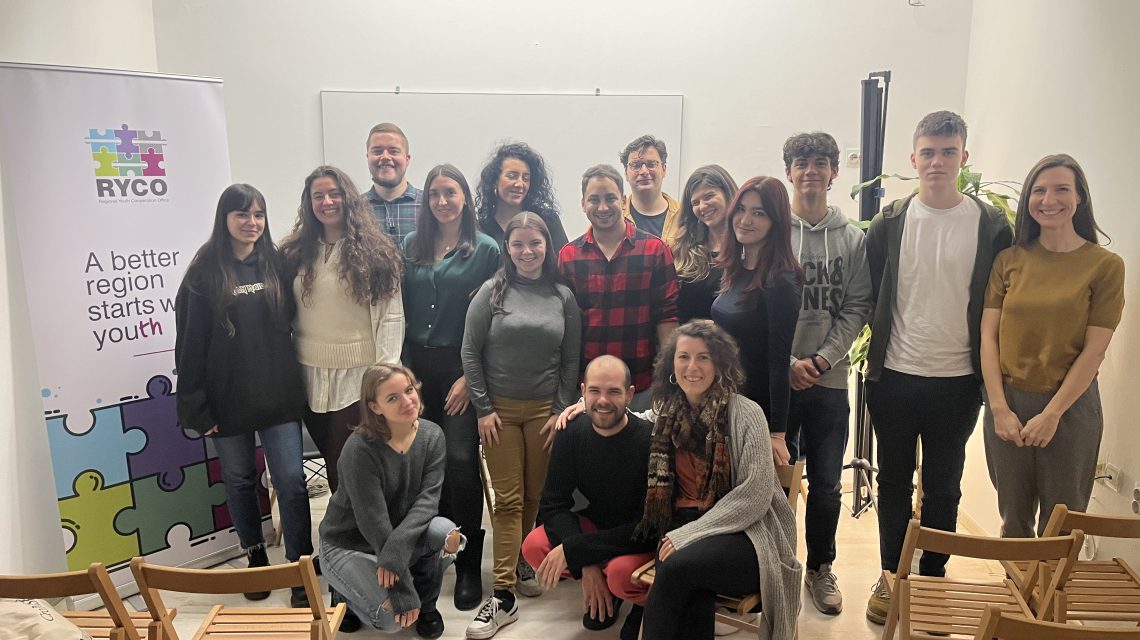
RYCO Youth Talk in Pančevo: Charting a Green Path for Youth Empowerment
Pančevo- On December 7th, the vibrant city of Pančevo witnessed an inspiring gathering of young minds at the RYCO Youth Talk held in SinhroHub. Themed “Youth for Greener Peace,” this event sparked engaging discussions that centered on the urgent need to equip the youth with the knowledge and skills to champion environmental sustainability in their local communities.
Empowering Youth through Green Skills:
One of the key takeaways from the RYCO Youth Talk was the unanimous call for additional support and information to cultivate green skills among the youth. Participants highlighted the importance of imparting practical skills that go beyond awareness, enabling young individuals to actively contribute to sustainable practices and initiatives in their communities.
Navigating the Legal Landscape:
The discussions also underscored the significance of understanding the legal framework surrounding environmental issues. Participants emphasized the role of different treaties, conventions, and local laws as protective measures for youth actively addressing environmental challenges. Armed with knowledge, the youth can navigate legal complexities, ensuring their efforts are not only impactful but also legally supported.
Early Education: Planting Seeds for a Sustainable Future:
A resounding consensus emerged on the necessity of integrating interesting and informative environmental segments into educational curricula from a very young age. The participants stressed the importance of fostering a sense of environmental responsibility early on, recognizing that education is a powerful catalyst for nurturing a generation that cares deeply about the planet.
Chapter 27 and the YPS Agenda: Guiding Lights for Youth Advocacy:
Amidst these discussions, the significance of Chapter 27 and the Youth, Peace, and Security (YPS) agenda stood out as guiding documents for the youth empowerment process. Chapter 27 recognizes young people as essential contributors to peacebuilding efforts, and the YPS agenda provides an umbrella framework that embraces the intersection of environmental sustainability and youth engagement. These documents, participants agreed, play a pivotal role in shaping the narrative for youth-led initiatives, offering a roadmap for a greener and more peaceful world.
In conclusion, the RYCO Youth Talk in Pančevo illuminated a path forward—a path where informed, skilled, and empowered youth become the driving force behind sustainable change. By addressing the urgent need for green skills, legal literacy, and early education, and by leveraging the principles outlined in Chapter 27 and the YPS agenda, the youth are poised to be the architects of a future where environmental consciousness and peace go hand in hand.
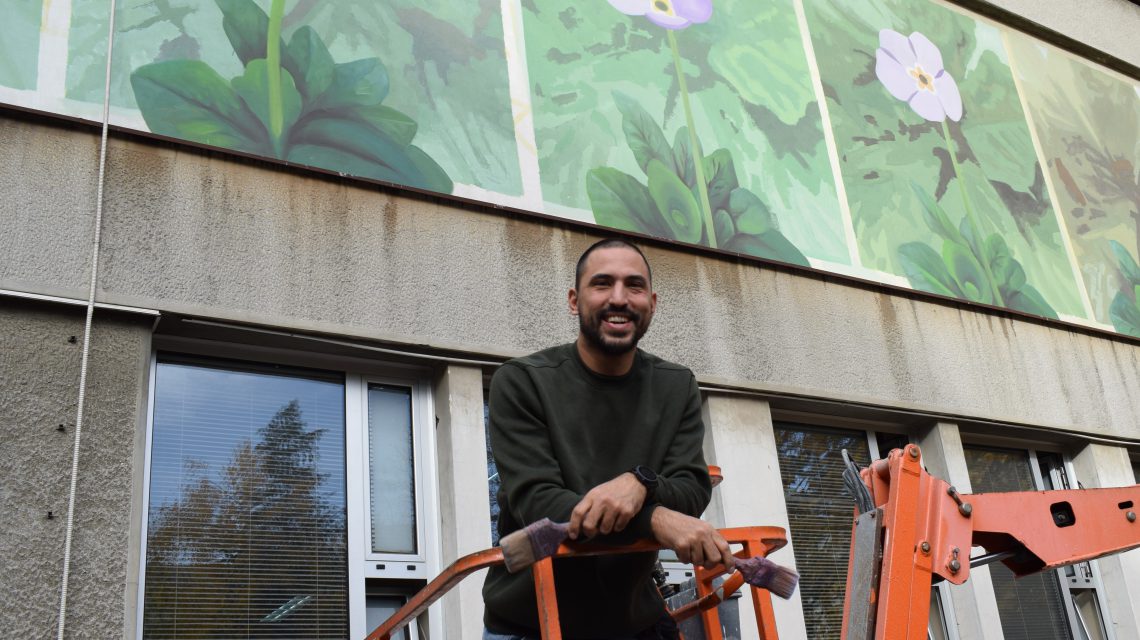
Paint for Peace: Engaging Students of Faculty of Political Sciences in Youth, Peace, and Security
Belgrade- RYCO Local Branch in Serbia within RYCOgnized project supported initiative “Paint for Peace: Engaging Students in Youth, Peace, and Security”, which was designed and organized by students of the master’s study Peace, Security and Development within the subject “Joint project”, was realized at the Faculty of Political Sciences, University of Belgrade.
The project consisted of painting a mural on the facade of the Faculty of Political Sciences depicting the Ramonda Serbian flower in order to promote the values associated with the Youth, Peace and Security Agenda, as well as the “Youth, Peace and Security” conference that was held on 2nd December on the Faculty of Political Sciences. Students had a chance to discuss the topics of gender equality, violence against women and girls and the current issue of armed violence.
The conference was opened by the students of the Master’s program Peace, Security and Development, Ms. Milica Đoković and Mr. Milan Petković, who announced that the conference will discuss the most important topics related to young people, their participation and the role that young people play in society.
Ms. Augusta Featherstone addressed the audience on behalf of the Organization for Security and Cooperation in Europe (OSCE) Mission in Serbia, who emphasized that it is a great pleasure to work with young people, for the needs of young people, not only in Serbia, but in all contracting parties. Ms. Ivana Markulić, on behalf of the RYCO LBO Serbia, emphasized the importance of the Faculty of Political Sciences as an institution where scientific research is conducted on these topics, but also academic discussions in order to reach a solution. “The main reason why we supported this project is precisely the young people, who as citizens can make changes and that’s why you should be here, in a place where you can debate, re-think and discuss these topics.” Ms. Markulić said.
Vice-dean for studies of the first degree of higher education at the Faculty of Political Sciences, prof. Dr. Natalija Perišić pointed out that the strongest side of this institution is its students who enjoy an interdisciplinary approach and the possibility of looking at a wider aspect of the studied topics. One of the leaders of the master’s study Peace, Security and Development and the mentor of this project, prof. Dr. Filip Ejdus, explained how the students created the project, designed and realized the painting of the mural and the organization of the conference within the subject “Joint project”. He thanked the students for the initiative, as well as the Regional Office for Youth Cooperation and the Organization for European Security and Cooperation for recognizing the importance of this project and helping in its implementation.
Opening remarks were given by Ms. Milena Stošić, RYCO Head of Programs. She referred to the similarities and differences between the two UN agendas (2250 and 1325) that are dedicated to youth and women, and emphasized that their greater synergy is needed. She also emphasized why women and young people should be actors of implementation of these agenda, not just be perceived as victims and objects of security measures.
After the introductory part of the conference, a mural of Ramond Serbica was unveiled on the building of the Faculty of Political Sciences, authored by Andrej Žikić Artez. Ramonda serbica, commonly known as the Serbian Phoenix Flower, is a rare and resilient plant endemic to the Balkans. It is known for its ability to survive drought and remarkably revives upon contact with moisture. This perennial, featuring rosette leaves and purple flowers, symbolizes endurance and rebirth, serving as a poignant reminder of nature’s resilience. In Serbia, it is used as a symbol of Armistice Day, commemorating the end of World War I. This mural represents youth’s role in fostering peace and societal resilience in the face of violence.
The topic of the first panel was “Gender-based violence”, which was addressed by Ms. Zorana Antonijević, an expert on gender equality and youth inclusion, Ms. Katarina Popović, a master’s student at the Faculty of Political Sciences, and Ms. Miljana Pejić, Secretary General of the National Youth Council of Serbia (KOMS). Ms. Antonijević pointed out that violence against women is deeply rooted in the history and essence of our communities. In order to change the current situation, education must play its role and recognize these types of violence. Ms. Popović, a master’s student at the Faculty of Political Sciences, reflected on the paper in which she wrote about a case that united young women and made them fight together against misogyny in the media. According to Ms. Pejić, social networks must recognize these types of violence, because young people use them as a basic channel of communication. She also shared what the National Youth Council of Serbia is doing on this topic, but overall what is their contribution to the implementation of the UN YPS Agenda. This panel was moderated by Ms. Nevena Robajac, student of the Peace, Security and Development department.
“Empowering the future: young people as protectors of public security” was the topic of the panel where students Ms. Katarina Bogićević, Ms. Dragana Radusilović, Mr. Edis Muminović, Ms. Ksenija Đorić, Ms. Iva Kojić, Ms. Maša Mihajlović, Mr. Konstantin Mitić and Ms. Bisera Marković presented proposals for practical policies: Gender Based Violence, Peer Education, Youth and Security as common good, Online Security of Young People and Reform of Serbian Council for Security towards inclusion of Minority groups. The moderator of the panel was Master’s student of Peace, Security and Development department Mr. Spencer Reynolds.
On the third panel, “The impact of armed violence on youth security in Serbia”, researcher Mr. Dušan Stanković from the Belgrade Center for Security Policy, expert in security sector management and conflict transformation Ms. Sonja Stojanović Gajić and students of the Faculty of Political Sciences Mr. Srđan Baša and Mr. Dimitrije Kljajić spoke. The moderator of the panel was Ms. Milica Starinac, a Master’s student in Peace, Security and Development.
Mr. Stanković spoke about the perception of the weapons problem in Serbia. He highlighted this problem as high-risk, and as a result of the legacy of the 1990s. Ms. Stojanović Gajić referred to the importance of the gender, age and cultural context that must be present in dealing with this topic. Students Srđan Baša and Dimitrije Kljajić presented a practical policy proposal that is directly aimed at regulating the negative impact of armed violence on the safety of young people.
This initiative was also supported by OSCE Mission to Serbia and company Tenge DOO. RYCOgnized project is financed by the Federal Foreign Office.

2 Youth Talks unfold in North Macedonia with members from NYCM and Union for Youth Work
Skopje- On November 16, representatives from the LBO North Macedonia participated through facilitation in a Youth Talks event within the General Assembly of the National Youth Council of Macedonia.
This collaborative opportunity enabled the LBO North Macedonia to collect input from representatives from various youth groups and CSOs for the Youth, Peace and Security agenda of the United Nations. The fruitful discussion resulted in a set of recommendations, which RYCO will take into consideration for the development of the strategic plans and designing specific approaches to address the necessities of the youth groups and CSOs in the country.
Building on this, on November 27, LBO North Macedonia hosted another successful Youth Talks event, in collaboration with the Union for Youth Work. This time, the event brought together youth workers and volunteers from municipal youth centers from Veles, Bitola, Probishtip, Ohrid and Kavadarci to engage in a discussion on various topics, addressing the challenges that young people face in their place. Additionally, they got well acquainted with the scope of work and the successful stories from the activities implemented by the Regional Youth Cooperation Office in the Western Balkan.
The attendees were welcomed by Mr. Albert Hani, Secretary General, Mr. Vladimir Gjorgjevski, Head of Local Branch Office in Skopje and Ms. Martina Jachevska from the secretariat of the Union for Youth Work.
Youth Talks represents a unique opportunity where participants could share experiences, ideas and create opportunities for further cooperation. In the future, we hope to practice activities of this nature more often to strengthen the networking and cooperation between the members of the municipal youth centers.
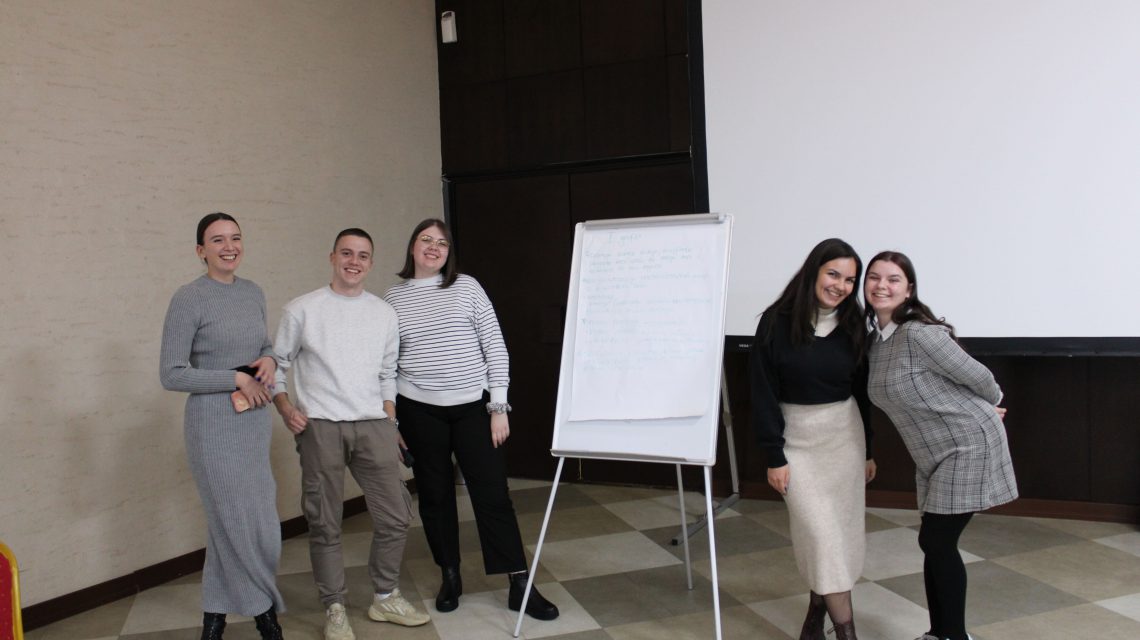
20 Youngsters Take Part in Training on Youth, Peace and Security Agenda in Serbia
Vrnjačka Banja- RYCO Local Branch Office in Serbia in collaboration with the National Youth Council of Serbia (KOMS) and with the support of OSCE Mission to Serbia organized 4 days long Capacity building training for young people from Serbia on UN Youth, Peace, and Security (YPS) Agenda from 26th to 29th November. The main goal of this activity was to educate but also to inspire and empower a new generation of leaders from Serbia dedicated to fostering positive change on both local and regional levels.
20 youth activists and representatives of youth organizations had an opportunity to familiarize themselves with UN YPS Agenda, it’s importance, priorities, strategic objectives and how it is connected with the mission of their organizations, but also why this Agenda is crucial for further development of democratic processes in Serbia and fostering of active citizenship among youth. One of the main results of this training is mapping of local and regional stakeholders in order to more efficiently develop Local and Regional Agenda in the future, but also to accelerate local initiatives that will promote and implement YPS Agenda, focusing on local context and needs of young people in different communities in Serbia.
Special focus was put on the methodology of how to include in the implementation process all groups of young people as well as how to raise awareness of those who are still not active or do not see themselves as someone who can make a change. Reconciliation process and its close connection with peacebuilding was highlighted as one of the important topics within this Agenda that should be more included in the educational system and overall systematically teached and discussed. Participants got a chance to present what is done in their communities regarding YPS program implementation areas and what should be done more, modified or even kept as a good practice. Ms. Aleksandra Mihajlović, Program Assistant in KOMS, presented the just published publication “Youth for Peace and Security: Analysis of UN Agenda in the context of Serbia” that showcases the current situation of the implementation of the UN Agenda 2250 in Serbia. This training was also a space for Serbian United Nations Youth Delegates Ms. Tamara Marjanović and Mr. Mihajlo Matković to present their work, mandate and promote this opportunity for young people.
The aspiration to build an inclusive and just peace encouraged the adoption of the Youth, Peace and Security Agenda. Founded in United Nations Security Council Resolution 2250, the Agenda emphasizes the importance of involving youth in all phases of peacebuilding, from conflict prevention to rebuilding trust and cooperation after conflict. The development of the Regional Agenda for Youth, Peace and Security for the Western Balkans is one of RYCO’s strategic priorities until 2025. KOMS also works strategically at the local level to achieve the goals set in UN Agenda 2250 and together with the RYCO office in Serbia will work on the development and implementation of the Regional Agenda in the coming period.

RYCOgnized Vision Conference in Sarajevo: Fostering Collaboration Among Stakeholders
During the RYCOgnized Vision Conference in Sarajevo, RYCO representatives met with representatives of the Ministries of education from Albania, Bosnia and Herzegovina, Kosovo*, Montenegro, North Macedonia and Serbia to discuss and evaluate the results of the previous period and to exchange opinions for joint endeavors in the future.
Conference days were opportunity for another meeting related to broader regional policies and processes, as well as modalities and potentials for further cooperation between regional organizations.
On this occasion RYCO Secretary General Albert Hani and Deputy Secretary General Denis Piplas met with high representatives of CEFTA, Energy Community, Transport Community, Regional Anti-Corruption Initiative (RAI), Regional Cooperation Council (RCC) and Regional School for Public Administration (ReSPA).
Participants in the meeting also discussed challenges and opportunities for regional cooperation in the light of the forthcoming 10th anniversary of the Berlin Process.
*This designation is without prejudice to positions on status and is in line with Security Council Resolution 1244 and the ICJ Opinion on the Kosovo Declaration of Independence
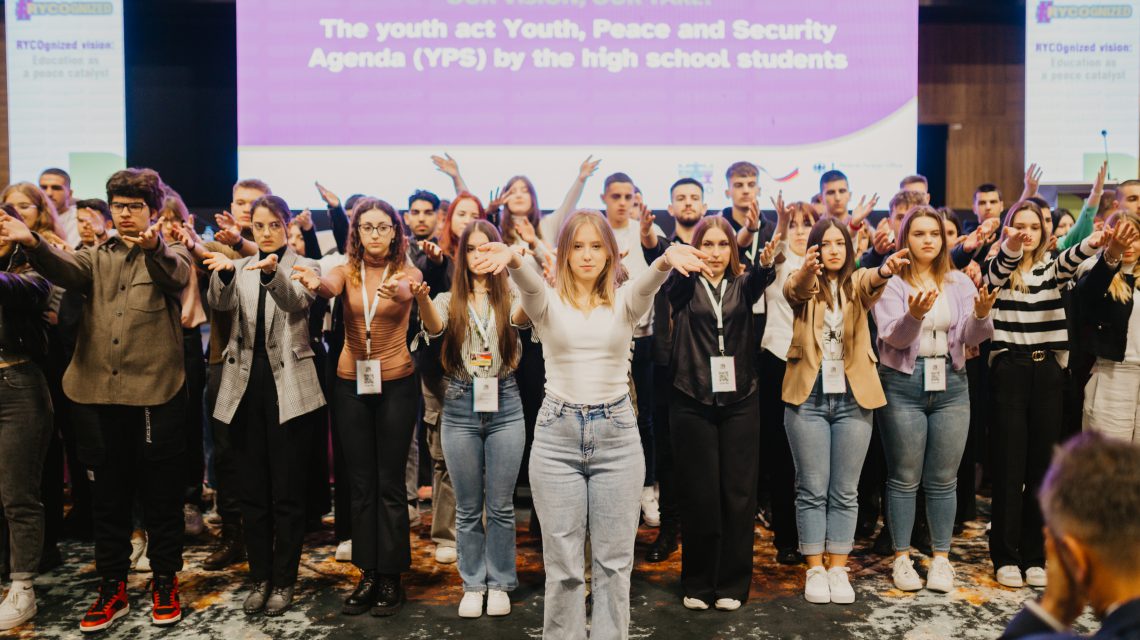
RYCOgnized Vision: Future can’t wait, now is time to accelerate youth peace and security agenda
SARAJEVO 24th November – Now, and not in some distant future, is the right moment to put joint efforts and invest in young people of the Western Balkan region by fostering dialogue and understanding across cultures. This is the joint message from the RYCOgnized Vison Conference that brought together in Sarajevo more than 250 participants, including representatives of public institutions of RYCO contracting parties, international and regional organizations, EU Delegation, Embassy of Republic of Germany in BiH, along with teachers, educators and high school students. Event served as a pivotal platform to showcase RYCO’s commitment to fostering regional cooperation, empowering youth, and advancing peacebuilding efforts in the Western Balkans.
On the opening ceremony RYCO Secretary General Albert Hani emphasized the importance of the role that young people in the region carry in the process of peace building and reconciliation calling all parties on urgent action.
“The journey we are taking is not easy. It demands full time commitment, resilience, collaboration and dedication to support youth and their voice, while at the same time supporting peace and reconciliation in all the region,” said SG Hani.
He concluded that there is no public policy that is of no concern to youth and that attention of all social actors is required in order to provide most adequate responds to youth needs and to assure their voice to be heard.
In front of host, Deputy Minister of Foreign Affairs of Bosnia and Herzegovina, Josip Brkic, said that now is the moment to act as the young people are undeniable present. Thus, as he said, concrete steps are needed, such as investment in education and health, along with implementation of all relevant measures related to youth policies.
“This event is not just celebration of past achievements, but also an opportunity to reflect on the collective journey we all undertake, and to set the course for the future,” said Deputy Minister Brkic.
Event that took place from 22-24 November was an opportunity for various parties to exchange opinions and offer different perspectives related to betterment of conditions and promotion of the role of youth in society. Through different panel discussions, participants had a chance to learn how youth policies and interests can find its space in different processes of decision and policy making, public governance, security, gender equality, as well as transport, trade and economy.
With RYCOgnized Vision, along with other exchanging and inclusive programs, RYCO strives to create conditions for meaningful participation of youth in policy making. By doing so, RYCO is recognized as an indispensable component in building a peaceful eco system in the region.
Integral to the conference was the screening of a short documentary showcasing the real impact of education as a catalyst for peace, particularly through Superschools Homestays, encapsulating lived experiences through hosting that promote regional cooperation. The Superschools program, a school-to-school exchange mobility scheme, spanning two open calls, has supported 160 schools, fostering 80 partnerships and involving 320 teachers. Over 2000 young individuals have been actively engaged, contributing to the program’s far-reaching impact.
When asked about this transformative experience, Sara Križić, student from Catholic School Centre “Saint Francis” Tuzla, shared:
“The Superschools experience was something for me that I will never forget and that I will forever cherish. I met so many great people down the line and experienced things that I would have not experienced if it weren’t for this program and for the whole organisation. Not only have I gained friends for life, I have also gained knowledge that I would never want to replace with anything in the world”
The conference concluded with networking sessions and a joint dinner honoring educators, fostering further collaboration among regional stakeholders.
About RYCOgnized
This initiative project financed by the German Ministry of Foreign Affairs, aims to empower youth, institutions, and civil society organizations and also position RYCO as a central hub for cooperation, knowledge-sharing, and practical engagement in youth, peace, and regional cooperation.
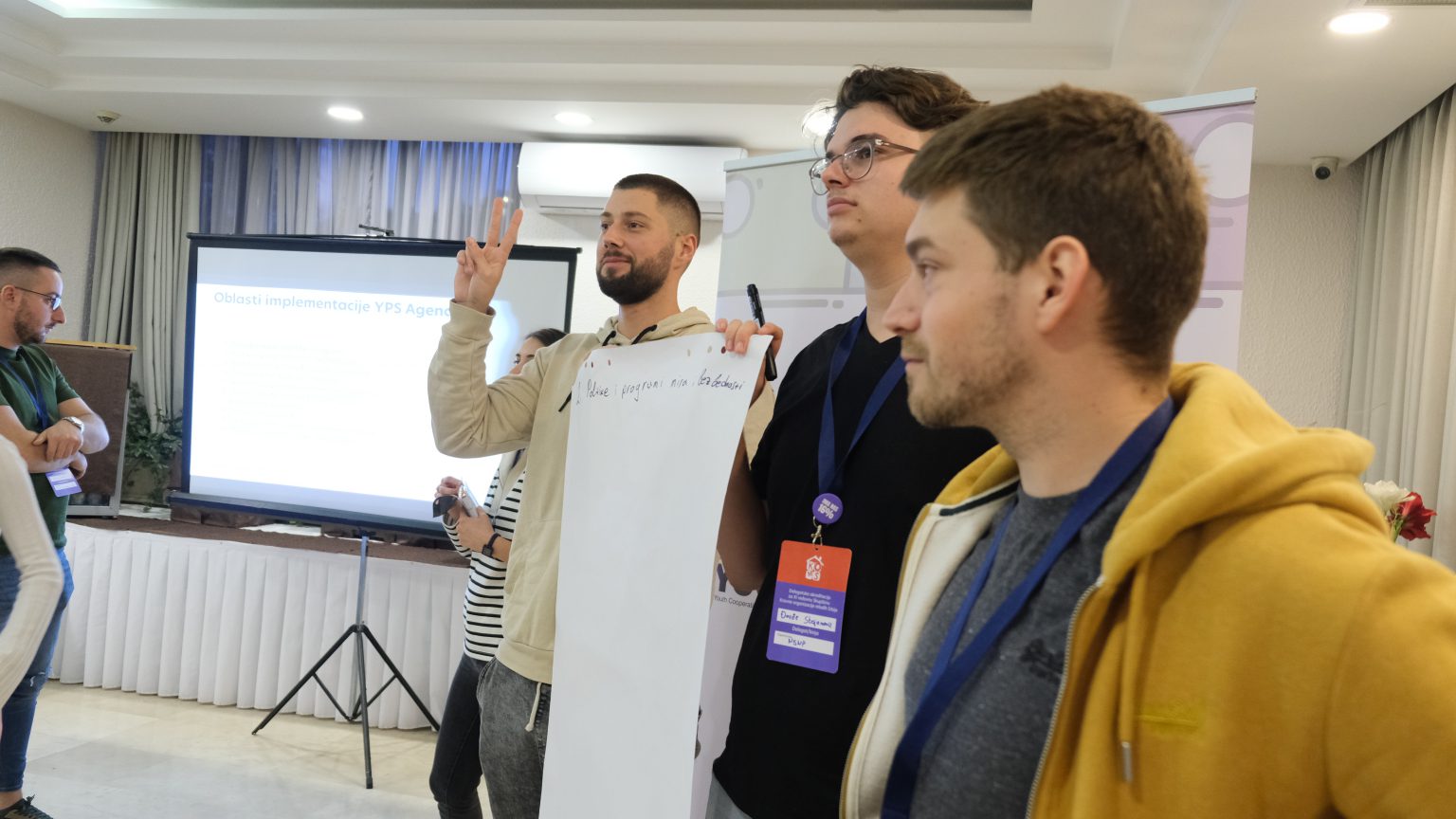
Youth in Serbia: Catalysts for Peacebuilding
Bajina Bašta- RYCO Local Branch Office in Serbia organized on 28th October 2023. the fourth Youth Talk this year that was focused on the UN Youth, Peace and Security Agenda. This event was co-organized with the National Youth Council of Serbia (KOMS) and took place in Bajina Bašta where the Annual KOMS Assembly was held.
More than 40 young people, representatives of youth organizations and organizations for youth from all parts of Serbia discussed priorities of YPS Agenda, presented what their organizations are doing on local level under this Agenda, what are their needs in order to build their capacities and further develop activities in order to be more efficient and sustainable. Opening remarks were given by Ms. Aleksandra Mihajlović, Program Assistant in KOMS and Ms. Ivana Markulić, Program Officer in RYCO LBO Serbia: they have familiarized participants with YPS Agenda priorities, core pillars and why its implementation is crucial for youth, their position and youth policy overall, not just in Serbia but in the whole Western Balkans region. Special focus was put on the local context, why peacebuilding and reconciliation processes are important and on which way these organizations are involved in it and on which level.
This introductory part was followed by group discussions that address main YPS implementation areas: youth policies and programs, policies and programs of peace and security, foreign policy and international cooperation, education, culture and art, economic and employment policy, justice and human rights policy, gender equality, healthcare policies, environmental protection and climate change, policies in area of science and technology. Participants have developed overviews of what is done in their communities regarding these program implementation areas and what should be done more, or modified or even kept as good practice. Conclusion of this Youth Talk was unanimous agreement that there is a need for joint actions, intersectoral and multisectorial cooperation and strategic approach towards implementation of UN YPS Agenda priorities in Serbia.
The aspiration to build an inclusive and just peace encouraged the adoption of the Youth, Peace and Security Agenda. Founded in United Nations Security Council Resolution 2250, the Agenda emphasizes the importance of involving youth in all phases of peacebuilding, from conflict prevention to rebuilding trust and cooperation after conflict. The development of the Regional Agenda for Youth, Peace and Security for the Western Balkans is one of RYCO’s strategic priorities until 2025. KOMS also works strategically at the local level to achieve the goals set in UN Agenda 2250 and together with the RYCO office in Serbia will work on the development and implementation of the Regional Agenda in the coming period.
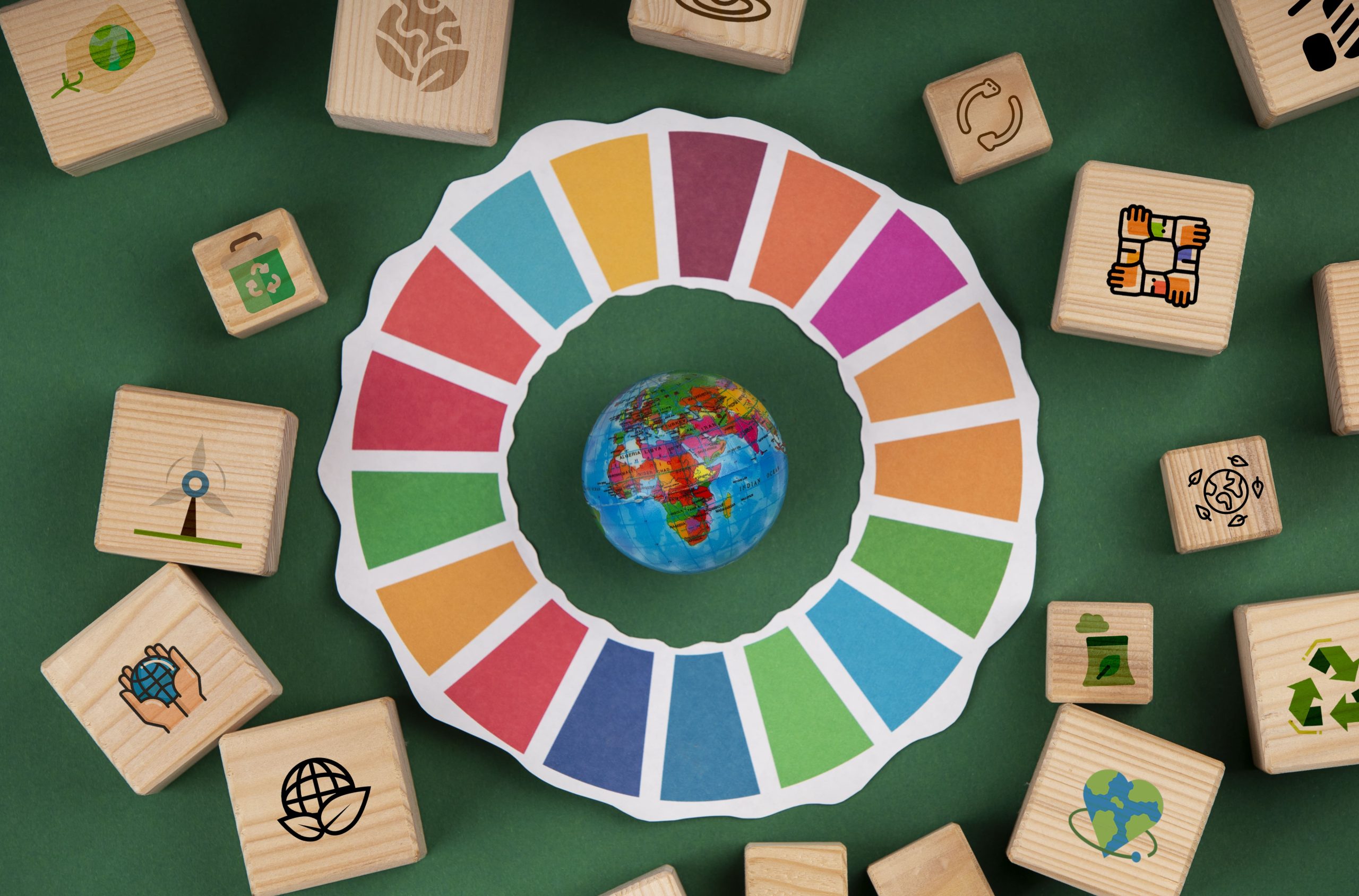
YPS, SDGs and Championing Disarmament
Last year, around this time, I was privileged enough to visit Hiroshima as a participant in the RYCO’s MIRAI programme implemented with the help of the Japan International Cooperation Center (JICE) and the Ministry of Foreign Affairs of Japan. Such a journey, particularly on my birthday, which, curiously enough, I share with the International Day for Disarmament and Non-Proliferation Awareness, was a poignant reminder of the profound impact of conflict and the urgent need for peace. Walking through the Peace Memorial Park, engaging with a second-generation Hibakusha, and witnessing the solemnity of the Peace Memorial Museum, I was inspired by a sense of solemnity and reverence. It was a humbling experience to stand amidst the remnants of a tragedy that forever altered the course of history. It was a turning point in my career as a youth activist, educator, and young diplomat.
Flas-forward one year ahead, as I reflect on my journey and the pressing global issues we face, I can’t help but emphasise the vital intersectionality between disarmament efforts, youth engagement, women’s security, and the Sustainable Development Goals (SDGs). These interconnected elements form the cornerstone of a more peaceful and sustainable world, and it’s crucial that we recognise their intrinsic relationship, as SDG 17 suggests. And what better partners in these efforts than those affected the most by it and least responsible for such horrors: the youths! This interconnectedness is what brought me here today to be one of 15 Youth Champions for Disarmament, my biggest personal and professional feat so far.
To reiterate, the linkages between disarmament, women’s security, and the SDGs are unmistakable. SDG 16: Peace, Justice, and Strong Institutions, in particular, underscores the importance of promoting peaceful and inclusive societies for sustainable development. Disarmament lays the groundwork for fostering a culture of peace, wherein the dividends of development can flourish unimpeded by the scourge of violence and insecurity. These threats undermine the very fabric of a peaceful, inclusive, and sustainable society and disproportionately affect vulnerable groups, including women, youth, and children. Moreover, the illicit arms trade exacerbates conflict, perpetuates human rights abuses, and impedes socioeconomic progress. By curbing the flow of arms, we can mitigate these deleterious effects and pave the way for sustainable peace and development. This underscores the imperative of implementing existing disarmament treaties and strengthening international cooperation in arms control and non-proliferation efforts.
At the heart of our collective aspirations lies the United Nations Youth Peace and Security Agenda, which acknowledges the pivotal role young people play in promoting peace and security worldwide. As a member of the Youth4Disarmament initiative, I’ve witnessed firsthand the passion, creativity, and determination that young champions bring to the table. So far, we talked with third-generation survivors of the nuclear testing sites, have talked to experts on Weapons of Mass Destruction (WMD), and professionals working at the UN Office for Disarmament Affairs (UNODA), the focal point within the United Nations Secretariat for all disarmament-related activities, working closely with member states, international organizations, and civil society.
The UN’s commitment to disarmament is deeply rooted in its foundational principles. From the earliest days of the General Assembly, the elimination of nuclear weapons has been a paramount objective apart from ensuring that the world war never occurs again. As Antonio Guterres, the current UN Secretary-General, aptly described, it is the “DNA of the United Nations.” This commitment is not a mere abstraction; it’s a solemn promise to future generations, including those like myself, who bear the burdens of past conflicts. Such commitment should not be taken as a utopian device but rather as a pragmatic tool to prevent any humanitarian catastrophe from repeating again.
However, what people often overlook is that disarmament extends beyond nuclear threats; it encompasses a broader spectrum of security challenges; it pertains to the safeguarding and protection of children and adolescents, particularly in relation to incidents such as mass shootings, arms trafficking, and radicalisation. Additionally, it addresses both biological and chemical weapons. It also encompasses the well-being of women, as seen by the prevalence of femicides and war crimes against women; the promotion of human rights and environmental concerns; and the prevention of the proliferation of organised criminal activities.
This brings me to the UN Agenda on Women, Peace, and Security—a critical framework for advancing gender equality and empowering women in conflict prevention and resolution. The agenda recognises women as not merely passive victims of conflict but as powerful agents of peace (the same notion attributed to young people in a later Agenda on Youth, Peace, and Security). Yet, their voices are often marginalized in traditional security discourse. The inclusion of women (or youth, for that matter) in peacebuilding processes is not only a matter of justice but also a pragmatic necessity for lasting peace.
As Youth Champions for Disarmament, my cohort and I are committed to advancing these interconnected agendas. Through education, advocacy, and grassroots activism, we can mobilise a global movement for peace and security. Our diversity should, as always, be our strength, and by harnessing the collective power of young people, women, and marginalized communities, we can overcome even the most entrenched challenges, such as proliferation and even nuclear threats. Or, to echo the words of the United Nations High Representative for Disarmament Affairs, Izumi Nakamitsu, “At ODA, we firmly believe that what Secretary-General Guterres calls a ‘networked and inclusive multilateralism’ also depends on how well we meaningfully include and empower youth.”
As part of our mandate, we will undergo a comprehensive training programme facilitated by the United Nations Office for Disarmament Affairs (UNODA), getting familiar with the existing mechanisms and frameworks that promote/ensure/call for disarmament among the member states. This training equips us with the necessary skills and knowledge to advocate for peace, disarmament, non-proliferation, and arms control within our communities, regions, and globally. We also engage in regular exchanges with experts from various fields, including UN agencies, civil society organizations, and diplomacy. Thus, knowing the Treaty on the Prohibition of Nuclear Weapons, among many other treaties, and A New Agenda for Peace is a must.
Moreover, the program adopts a regional focus, enabling us champions to share regional perspectives and connect with the global disarmament discourse in three regional workshops. Through these workshops and youth forums, champions collaborate and strategise on disarmament efforts tailored to our respective regional realities. Additionally, the 15 of us are provided with opportunities to present our perspectives at events held at the United Nations Headquarters in New York, thereby amplifying our multiplying youth voices on the global stage.
For us, the pursuit of disarmament is not merely a lofty aspiration but a practical imperative for safeguarding our common future. By “amplifying” the voices of youth and women, upholding the principles of the UN Charter, and embracing the transformative potential of the SDGs, we can build a world where peace prevails, prosperity flourishes, and justice reigns supreme. The journey ahead may be fraught with challenges, but with determination and solidarity, we can chart a course towards a brighter tomorrow. That’s what we, the Champions, really stand for.
About the Author: Mihajlo is a MIRAI alumnus, one of the fifteen UN Youth Champions for Disarmament, and a current UN Youth Delegate of Serbia, focusing on Human Rights Education, peacebuilding, and Sustainable Development.
*Youth, Peace and Security Agenda is all about mainstreaming youth opinion and participation in policy and peace dialogs. As a supporter of the YPS Agenda in the region, RYCO provides the space for youth to express their opinions and solutions for sustainable peace. However, views and opinions expressed are those of the author(s) only and do not necessarily reflect those of the RYCO. Neither the RYCO nor the granting authority can be held responsible for them.
